#quotes about exploring the earth
Explore tagged Tumblr posts
Text

Thought about them for a little too long
#quote is from#in the land of the penguins#of course#georges lecointe#emile danco#Danco is thinking something along the lines of ‘lol my tiny friend!!!’#while Lecointe is actively imagining himself as Danco’s wife#belgica expedition#polar explorers#polar exploration#polar explorer fanart#my drawings#madhouse at the end of the earth#i’m unwell about these men#so now you can be too :)#what’s their ship name anyway?#Lecointe/Danco#lecoico#geormile#dacointe#dancointe#(???)#danco/lecointe#emile/georges#would be funny#keep em guessing whether you mean Danco or Raco#though raco spells his first name without an ‘e’#was trying to make this look like they were posing for a photograph#not sure how well i succeeded#but this was fun
90 notes
·
View notes
Text
it’s about experiencing, not being perceived.
#aesthetic#life#short quotes#spilled thoughts#thoughts#spilled words#healing#explore#adventure#aesthetic quotes#love#nature#earthcore#the earth was made for lovers#quotes about life#self love#life quotes#lifestyle#reality#existence#thinking#life lessons
0 notes
Text
You guys do not appreciate Gaz enough so I’m here to sell him to you
this shit is important so yall better read
I truly don’t understand the lack of Gaz love -
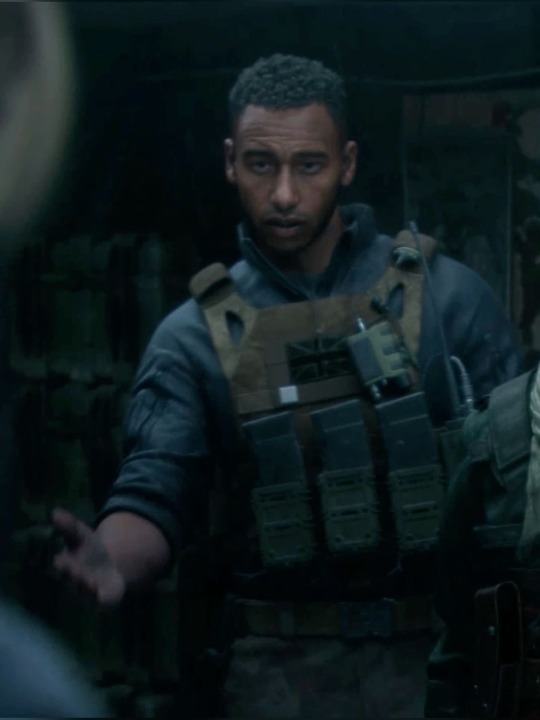
ok well
I do at some level
I think the argument usually levied against his character id that he’s boring
but beautifully stated by tumblr user mockerycrow in their character analysis of him
CHARACTERS DO NOT HAVE TO HAVE A TRAGIC BACKSTORY TO BE INTERESTING CHARACTERS
press keep reading to fall in love with Gaz
Who is Gaz?

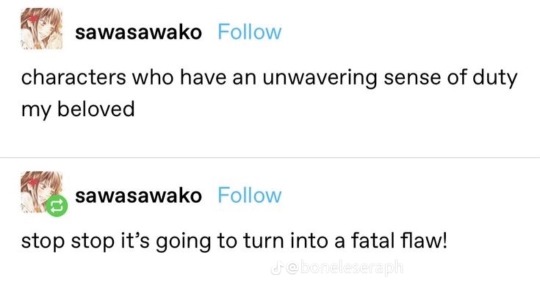
I’m going to start out with who Gaz is as a character
morality
Gaz is someone who has a strong sense of morality and struggles with the balance between doing the right thing and doing the morally right thing, there’s this debate between long-term morality and situational morality that Gaz struggles with
look im maybe not the most linguistically talented person on earth so im just gonna throw in a few quotes which i think gives Gaz
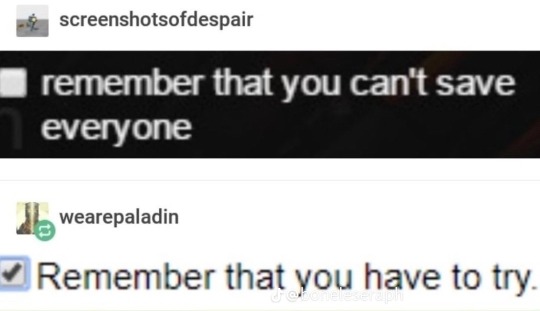
Gaz is someone who admist chaos and war is trying his best, trying his best to be a good person, to be reliable and to do the right thing
if thays not lovable idk what is
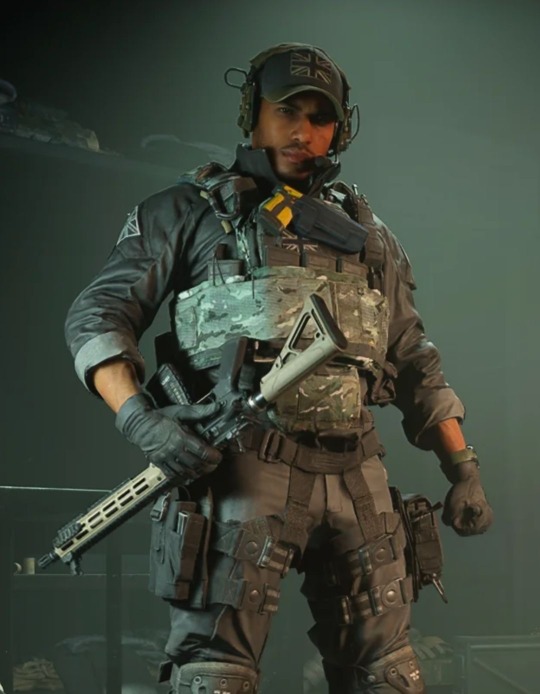
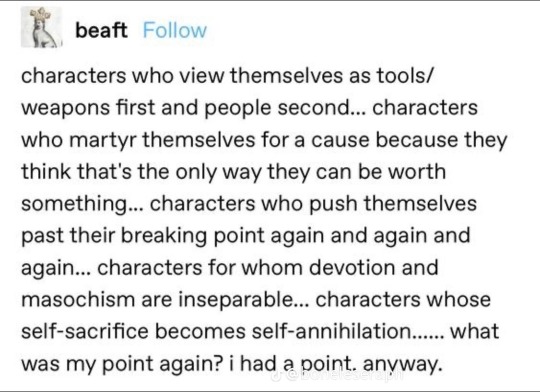

relationship to price
ok so i think this aspect of Gaz’s character is what people tend to focus on
and as much as the omg price’s son shit is cute i think he’s become a vehicle for people to emphasise price’s daddy factor (which like dont get me wrong keep up the good work)
but i think theres so much more to that
i forgot who wrote this but someone said something about Gaz trying to follow in impossibly large footsteps and i think thats so accurate
going back to Gaz’s struggle with morality there’s so much untapped potential in the idea that his idol, may not be an amazing person, having to come to grips with the idea that Price, his role model can look at a woman and child as interrogation leverage is something that i think people need to look into more
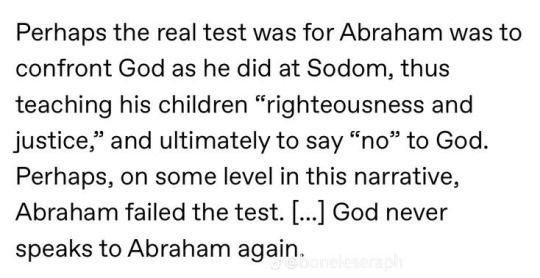
OK so now
Untapped Potential
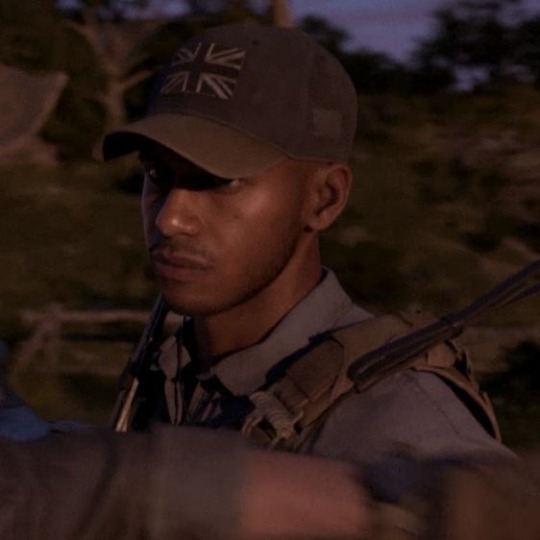
so here are somethings which i
idk if this is like the correct phrasing
headcannon? idk i just think these are parts of Gaz’s character which could be rlly interesting to explore
ahem
yes Gaz is a good guy, but that doesn’t make him passive Gaz has shown moments of anger, like in the interrogation with the butcher when he lunges at him or when him and price first meet
i think the fact that Gaz is so calm and collected but has these moments are cracks in the facade he creates
i believe personally he has a lot of repressed anger whether it be at the world, at himself, at his captain hes an angry dude hes just better at keeping it under wraps
and i know we don’t really have many details on his backstory but cmon there’s no way u sign up for a job like this and don’t have any issues whatsoever
i think this quote is so good for this because he’s harnessed his anger, it’s what makes him good at his job, a knife, a weapon
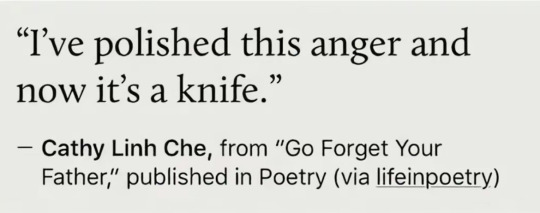
i think another interesting concept for Gaz is guilt
the fact that he cares about whats right and wrong how does he feel going to sleep at night? do these things haunt him? is he irredeemable?
i think its like that one quote “the dog that weeps after it kills is no better than the dog that doesn’t. My guilt does not purify me.”
Final Thoughts
anyways guys thanks for coming to my ted talk
i know this was really messy but i just want to encourage some Gaz love because i think he’s a really interesting complex character who we just need to dig a little deeper into
i hope this incites some more gaz love
THANK YOU 😳
#kyle gaz garrick#gaz#kyle garrick#gaz garrick#kyle gaz x reader#kyle gaz garrick x reader#call of duty#cod#call of duty modern warfare#cod mwf2#mwf#simon ghost riley#john soap mactavish#john price#cod mwii#gaz cod#ghost cod#price cod
2K notes
·
View notes
Text
Oh this is a great question to think about! Tbh I had a lot of hopes back when the series was premiering (and before when it was just announced), so to go off of those... well first off, I really really wanted an exploration of Loki's trauma, his past and even his psyche. Like I know a psychological thriller/horror probably wouldn't have been in the cards for a Disney+ show, but tbf I feel like the creators of Wandavision touched on aspects found in those types of genres (if in a PG 13 kind of way) so I don't think I was too off base for hoping to see something like that for Loki. (Not to mention the ridiculous comparisons to films like Se7en and The Silence of the Lambs that Mike Waldron kept making... but I'm not gonna get into that rant again.)
I think I would've put a lot of focus on what the hell actually happened to Loki when he fell into the Void and disappeared for an entire year or so, and how he ended up encountering Thanos and the Black Order, how that all went down, etc. Either through flashbacks, or (possibly altered) memories, or Loki recounting those events interview/interrogation-style (and being an extremely unreliable narrator in doing so, like for instance saying something like "I made a deal with Thanos and worked with him willingly" and then at some point you see into his head through flashbacks/night terrors and realize that clearly wasn't the case, just stuff like that). The possibilities were endless tbh, like there's just so many creative opportunities to explore that one aspect of Loki's backstory. And since that's such a burning question to me (and many other fans tbh) still to this day, I feel like that'd be the first thing I'd want to tackle.
Another important thing I'd want to include would be Loki's gender fluidity and his bi identity. Like I don't think it necessarily has to go with Loki referring to himself as bi, like I don't think he has to say the actual word "bi" in order to give any meaningful kind of rep?? Especially now that Agatha All Along has come out, I feel like I'd want to approach Loki's identity in a similar type of way, just unapologetic, and as authentic as possible to his comic book counter part. Like hell, he can have hang ups with those parts of his identity (which would actually make sense, being from Asgard and since he already has a lot of self-loathing issues in general due to being Jotun).
I wouldn't mind that, especially if it was done in a non-typical way, like maybe it's not being sexually intimate with men/males that's looked down upon on Asgard, but - similar to the Norse apparently - it's on what role they play, or basically who's the "bottom" - that gets shamed, or maybe same sex relationships aren't looked down upon at all on Asgard, but giving birth/getting pregnant while being/presenting as male is, bc it's seen as unnatural, and then let Loki go through an experience where he develops deep rooted insecurities about those aspects of his identity due to Asgard's cultural prejudices. And like this doesn't even have to be explicit (tho after the birth scenes in both Wandavision and especially Agatha All Along I can't help but roll my eyes at ppl having a hang up with Loki going thru something like this, especially if they were totally okay with Wanda and Agatha having birthing scenes, but anyways). It can be something as simple and as subtle as Loki finding out he's pregnant (maybe he can magically feel the fetus growing inside him, or he can hear the heartbeat/etc, or maybe it's as simple as having morning sickness and/or a change of diet). And it just ends up with him drinking tea/potion (due to pressure from Odin/Frigga/society, or maybe he's not ready and seeks it out himself) which gets rid of the baby, but again it's done in a very non graphic way. Of course the whole mpreg thing is just an example, and doesn't have to be in a series about Loki (that's what fanfic is for!) but basically: let Loki be queer, he can have hang ups about being queer, and tbh I'd want the hang ups to be kind of different from the usual discussions/portrayals of queerness in media mainly bc Asgard's an alien/fantasy society so I'd want their cultural norms to be pretty different from ours (human society in general), but overall just let Loki be queer, goddamnit!
Furthermore, I'd want to explore Loki's self loathing in particular, and see his view of himself change as he develops and grows throughout the series. If he encounters other versions of himself then I'd want to see what that would look like... and preferably done differently from how the show approached it (regarding Sylvie). Like I don't want him to just, I don't know, praise his other self up the way he ends up doing in the series (I know he also fought with Sylvie at the beginning but tbh I couldn't really take their rivalry seriously, it felt very sibling-like - which I actually enjoyed at the time, mind you, but a reflection of one's internal self-hatred it certainly is NOT, and like overall the whole dynamic just didn't work for me bc I find those two characters so undeniably different from each other and therefore it doesn't really work as a metaphor for self hatred/self love, but that's neither here nor there).
Like - let it be messy! Let it actually be vitriolic and hateful if that's what the series is trying to convey. Let Loki be angry, let him rage, let him lash out - at versions of himself and at other characters, like c'mon! This is a character that has a lot of inner darkness and has suffered through a lot of trauma and has difficulty trusting others due to said trauma (especially if we're going with Avengers era Loki) so how about we Show That.
Tbh I wouldn't have minded for Loki's main villain (both in the series overall and wrt the lead character) to be a version of himself. (As long as it was portrayed in a thoughtful way, like don't just make him evil please, in fact he doesn't even have to be evil at all - he doesn't have to destroy or conquer other worlds, he could literally just be out there destroying all versions of Loki, which would force our protagonist to fight/confront this person hunting him down). Like I think there would be so many possibilities for all of the ways a protagonist could deal with a "villain" - or rather, an antagonist like that. Some far more darker than others, depending on how you want your story to go. Like it could end similarly to the Agent of Asgard comics (where I believe Loki ends up forgiving and embracing his "evil" self... tho I've not read the comics so please feel free to correct me if I've gotten something wrong). Or if I were writing this series, I would've just had Loki forced into a position where, after being worn down to reaching his emotional breaking point, and in a fit of sheer rage, he'd end up brutally murdering the antagonistic version of himself, in the ultimate form of self destruction, and then I'd have him reeling from the internal consequences of such an extreme form of violence done against himself - but that's just my ridiculously morbid psychological-horror-loving ass for you. I'd just want to completely unravel him ngl, before having him overcome the impossible by rebuilding himself once more (w/ a little help from his newfound friends)...
If the TVA had to be involved in some way, I'd want to approach them as an ominous totalitarian organization, and if Loki were to be tortured by said organization, it most certainly would NOT be portrayed as some throw-away-attempt-at-comedy-type-of-scene (AHEM). I'd go for a darker tone overall, and Loki's torture at the TVA would be portrayed with all of the horror demanded by those types of scenes dealing with that kind of subject matter.
Tbh I have so many ideas for a Loki-centric show, some that involve the TVA and some that don't, but there's just so many threads and I don't want to make this any more convoluted than it already is, so to put it simply: I'd want the focus to be on Loki first and foremost. If it's called Loki, then it should be about the main lead, similar to how Agatha All Along was about Agatha, and Wandavision was about Wanda. (Which means, if the TVA has to be involved, then they would be secondary to the series' main focus - which would be on Loki and his relationship with himself.) Secondly, I'd want to see his trauma not only brought up, but fully explored. Which includes his traumatic upbringing (Odin's A++ Parenting, Frigga's enabling, family dysfunction, Asgard's toxic social/cultural norms) as well as the horror he experienced in the Void and on Sanctuary, maybe even some events in the first Avengers film, but seen through Loki's eyes this time. And I'd just want Loki to be queer, so if he's bi then let him have previous (or current!) relationships (or flirtations) with men (or attraction towards men) as well as women, if he's gender fluid then Show. That. Whether he physically transforms into a woman at times, or through his inner monologue where he refers to himself with different pronouns even if his gender presentation hasn't changed, or even his ambivalence towards being trapped/labeled in a one-gender-ticked-box, but Show. It. That part of his identity deserves to be shown, especially in a series where Loki's the central character.
If you yourself could’ve directed/wrote the Loki series, what would you have done differently? What would you have wanted to see in a series about Loki? What would you have focused on? Would the series take place somewhere other than the TVA? Which characters would you include? What would be the end goal? What aspects of his character would be explored?
#Loki#Loki Series AU#MCU Loki#So this was... A Lot.#I guess I had a lot of thoughts on the matter lol...#Also with regards to Thor: while I think his relationship with Loki is very important to Loki's character overall -#- I wouldn't want to place too much focus on their relationship mainly bc Thor already has his own film series...#(Which is meant to focus on Thor and on his relationship with his brother... )#(Now whether the films actually do a good job on conveying those things are a whole other matter... )#But yeah. Basically I'd want the Loki show to be about LOKI.#(Tho further exploration of Loki's love for his family and memories of his brother would definitely fall into this... )#Anyways this was long enough!#Loki Series Criticism#Just in case bc I didn't remain as neutral in tone as I initially wanted to be...#Also also: with regards to morality and redemption arcs... tbh when it comes to Loki I'm more interested in a character study approach...#Tho I wouldn't mind if he reflected on some of the destructive actions he's taken - from the invasion of Earth -#- to the attempted annihilation of Jotunheim...#As well as seemingly ''smaller'' destructive moments... such as when he'd nearly killed a human Thor back in the first film...#His denial of Frigga being his mother right before her death...#As well as his perceived guilt over Frigga's death...#(Assuming he somehow managed to see how his life would've played out had he not taken the Tesseract.)#More than anything I'd want to explore Loki's self destructive tendencies - and ultimately end it on Loki reconciling with himself...#Including the aspects of himself that he hates... whether it's as something as blameless as being born the ''wrong'' race...#Or being so very unlike the Asgardian ideal...#His feelings of being a ''monster'' due to his Jotunness...#As well as due to the destructive actions he'd taken during previous films...#''Deep down Loki wants to be Worthy''#(A paraphrased quote from the Thor: The Dark World BTS that I can't help but think about from time to time... )#If Loki were to have a redemption arc... I'd want it to play out in a way where it's completely intertwined with his self-healing arc...#Basically: You can't have one without the other.
170 notes
·
View notes
Text
HR department romance plots
I just… beyond the surface level of enjoying a new game with new relationship dynamics to explore, I really can’t feel much about the DAV companions or their romances.
They all just seem so disconnected from the story, from Rook (who in turn is entirely disconnected from all kinds of feelings because Rook is just Employee Of the Year), from the world, from themselves. I feel like Cole here, looking at them and saying in my gentle, fleeting voice: even the dwarves don’t really remember dwarves. It really feels like the interpersonal relationships are written by the HR person who sits with you as union rep to tell you that you should use a positive language, that "we are all simply employees here, it doesn't matter what title you have", give a little pep talk about teamwork and how to get the job done. That's what we're here for. Everyone's equal. We all want the same thing here, your boss is your friend. Have you tried talking to this person, see their side of things, mmmm? It's just... yeah, they're cute, all of them. But why do they like each other? Why do they want to be with Rook? Who are they even in relation to the world of Thedas, what do they believe in, what have they overcome, what do they hate, what sort of prejudices do they carry around? I have no idea.
And since I’m also replaying DAI again, I wanted to compare these romances to my canon romances in DAI. With Blackwall, you immediately get a sense of attraction and a sort of flirting on his part that suggests this is something he falls into quite easily - “you know a lot about girls” to quote Cole - BUT it’s also something he really, really thinks he shouldn’t be doing now. Why? He is tied to the Warden plot, if you bring him along you get a sense of a man hiding shit but you don’t really understand what, and he still comes to see you (flying/climbing up your balcony wall idk) because he can’t step away. You get to tell him he’s a good man even though you know shit about that at this point, like with Anders in DA2 you can give your PC over to this passion/love despite knowing that there’s something off, something potentially harmful or dangerous. There is conflict, there are things that jar, that can even make you uncomfortable.
Blackwall as a character is open and compassionate. He approves of mercy, shows mercy, he isn't judgmental of others. In sharp and delicious contrast Blackwall’s crime is vile. He isn’t bound by any sort of oath, he can back down, there is no greater good whatsoever in his actions. It’s inexcusable. And yet. YET. You can CONTINUE THE ROMANCE. He killed a wagon full of kids, THEN RAN AWAY AND LET HIS MEN TAKE THE BLAME and hates himself so much that he tries to become someone else by erasing his previous self from the face of the earth. You can still kiss him and tell him you want him to live and redeem himself. It’s fucking incredible to think about this in the light of Veilguard actually. Your LI, the child murdering coward.
With Iron Bull you have the doubts all spread out on the table. He’s a spy, how could you ever trust him? He also doesn’t respond to your flirting, why the hell not when you hear through ambient dialogue that he’s fucking half the chantry, isn’t he supposed to be a fuckboy? But he’s fun, he’s a mystery, he’s got fascinating banter with everyone, he’s brought his found family along, he’s a Qunari who at least somewhat believes in the Qun - he’s got AMAZING conversations with Solas that characterizes Bull as deeply intelligent (and Solas as much more caring than he’d let on) and knowledgeable about surprising things like architecture. Cole, as always, gives us more insight into Bull’s mind along the way and even before the offer to ride the Bull, the idea of him has been through some adjustments. You change his idea about a lot of things and in return, Bull challenges your idea of him, your idea of the Qun, your idea of the world and possibly, depending on how you react to his romance, your idea of intimate relationships. The game’s writing allowed me to imagine a rather frumpy circle mage in her mid 30s reluctantly forming a friendship with this strange fellow, only to find herself very much attracted to him, only to find herself being cared for in a way she would never have let anyone do before simply because Bull told her that was the only way he’d be with her. This is how we’ll do it, are you in? Your LI, the service top Qunari spy who is terrified he’ll run mad without his belief system to dictate his actions.
And Solas. I mean mythical love stories culminating in mythical endings aside, what I really fell for in this relationship was the refreshing dynamic not of enemies to lovers but of two souls just sort of connecting instantly during strange events, taking a few hard looks at each other and going oh shit it’s you, you get me HOW is it possible you get me when nobody else does? There’s so much external drama surrounding them, which is why I personally LOVE and ADORE how calm their internal connection actually is. They know, so early in the game, that this is it. You’re my home, you understand the bones of me, you ask questions no one else thinks of asking, you care about the world in a way I haven’t seen anyone else do. He is LITERALLY the only one who understands your Lavellan when they make her the herald, when she protests and they keep pushing and pulling and sing their song after Haven, and Solas is there to be sarcastic about it. If nothing else, I'd fall in love with that. And there’s this sense of impossibility from the very beginning, a sense of it being almost unreal because the first kiss is in the Fade, the second is in a frenzy where Solas goes from 0 to I LOVE YOU, MY HEART and then leaves and you know, you know how this is coded and YET - he seemed so wise and kind and sad, it goes like this, the fourth, the fifth. And even with this connection of souls, things chafe - he’s an absolute bastard about certain things, he mocks your heritage and you don’t know yet that it’s because a huge guilt blanket rests on top of him since thousands of years back, you can just argue back and receive his disapproval. He says it’s selfish of him to start anything with you yet he does - WHY DO YOU DO THAT, SAD EGG? Your LI, the ancient god of rebellion, treachery and lies, depending on the story.
Even beyond my favourites, there are conflicts. Sera is A LOT (affectionate) if you're an elf, with Cullen you get a substance abuse story-line tied to his general dismay about his past as a really fucked up templar, Dorian has personal trauma and cultural prejudice he struggles with for the entire game, Vivienne is so complex half the fandom hates her and has very awkward and uncomfortable banters with almost everyone (save for Bull because he treats her like he would a tamassran), Cassandra is constantly challenged in her personal beliefs, very clearly reflected in her conversations with Solas and Cole has a whole personal plotline about deeply existentialist matters. What does it mean to be alive? Who is a person and who gets to decide that? He could have been a person, Varric says. Isn't he already? Does this unit have a soul? Not to mention that Cole functions chiefly as a speaker of truths, bringing a lot of complexity to the others.
DAI is not perfect by any means but I feel like I know these bastards. I feel like my PC or even I could actively dislike some of them, because they are written to create dynamic conflicts inside and outside of their own arcs. I can write fic about them, I can imagine what they're doing during the events of DAV because I know them.
Because they are written like actual people in a world where some people have power over others and some people have been raised with a certain belief system and some people just have shitty takes on society, may they learn.
897 notes
·
View notes
Text
“I have many names”: Halbrand, the Repentant Mairon in “Rings of Power”
The themes of redemption, second chances and forgiveness are major in Tolkien legendarium. This is due to Tolkien’s Catholic faith, and the belief that no one is irredeemable in the eyes of God, no matter how low they might have fallen.
And we see “Rings of Power” exploring these themes with Sauron’s character in Season 1. Or better yet, with Halbrand, which is the name the show chose for “Repentant Mairon” (Sauron’s original name) of Tolkien lore.
Nothing is Evil in the Beginning
This is the first quote in “Rings of Power”, narrated by Galadriel. This is a reference to Elrond’s quote in “Fellowship of the Ring” book: “For nothing is evil in the beginning. Even Sauron was not so.”

In the beginning of time, in the Days before Days, Mairon (the admirable) was created by Eru (God) as a Maia of Aulë, and he was one of the most powerful Maiar (demigods or angels). He was a Maia of smithing, perfection, order and beauty, with qualities like goodness, purity of heart and loyalty, and a dislike for wastefulness. He helped shape Eä (the material universe) alongside the Valar and the other Maiar, during the Ainulindalë (the music of the Ainur), and these qualities (smithing, perfection, order and beauty) were, most likely, his contributions.
Due to his power, he was targeted by the Dark Lord Melkor/Morgoth (the most powerful of the Valar), who seduced him, with promises of greater power. Morgoth is the Satan of Tolkien lore; he was envious of Eru’s capacity of creation, and wanted it for himself. Unable to have it, he devoted himself to corrupt it (which included the corruption of several Maiar), and destroy it.
Becoming Sauron
Mairon, being an idealist, betrayed the Valar and joined Melkor, seeing in him the opportunity to make his ideas a reality. He went on to become Morgoth’s most devoted servant and chief lieutenant, in charge of Angband fortress, in Middle-earth, during the First Age.

Mairon was corrupted by Morgoth, and reshaped into darkness, and all of his qualities reversed: his love became obsession; of order and perfection into dominion and tyranny; beauty into ugliness and monstrosity (by the breeding of the Orcs), goodness into evil, and his loyalty and purity of heart into treachery and deception, becoming the “great deceiver”. The Elves created the name “Sauron” (the abhorrent), as a mockery of his own.
Eventually, Mairon started to resent Melkor, because their goals turned out to be opposite: while Melkor is chaos and destruction, Mairon is order and perfection. Melkor is brute force, Mairon is the brain. What Melkor wanted to destroy, Mairon wished to perfect. Melkor is chaotic evil, while Mairon is lawful evil.
Mairon’s whereabouts are unknown during several periods of time, especially after his defeat at the hands of Lúthien and Huan, the Hound of Valinor (so it’s uncertain if he was hiding from Morgoth, or if Morgoth locked him up somewhere).
Season 2 of “Rings of Power” has already began shedding some light on this, in 2x07:
Sauron: Be not afraid. This too shall pass. I promise you, when Middle-earth is healed, and its people see what you and I did here… all our sufferings will be worth it. Celebrimbor: “Our sufferings”?

Do you know what it is to be tortured at the hands of a god?
Sauron mentioning Morgoth next and how he treated him, seems to indicate that’s what he meant by “all our sufferings will be worth it”. And this idea goes on in this dialogue:
Sauron: Sometimes, the pain almost became a reward. Became a game. A contest, to see whose will was the mightier. Celebrimbor: And after all that, you would still choose to inflict the same pain upon me? Sauron: No. You chose it. Not I. Celebrimbor: What?
I already analyzed this scene from Tolkien theological views of this dynamic, but we can also talk about the wild amount of projection Sauron is doing here. Because the core theme of this scene is Morgoth’s treatment of Sauron, and how he’s replicating that with Celebrimbor. Which might indicate these were things Sauron himself heard from Morgoth in the past: the pain is a reward; you chose it; you [are] the true author of your own torment.
And Celebrimbor saw through this, which explains his reply to Sauron’s nonsense:

And his advise to Galadriel, in the same episode:

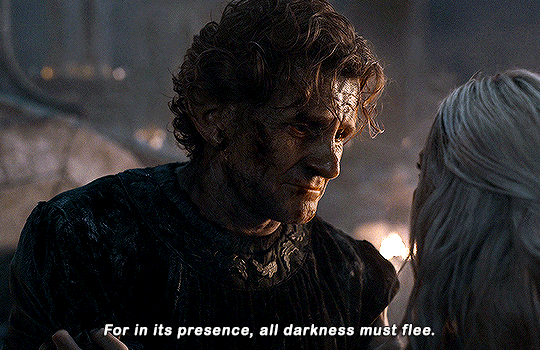
We also see Sauron crying while hearing Adar’s tale, in 2x01: “I was in your place once. In the eldest of the Elder Days. Thirteen of us were chosen to be blessed of Morgoth’s hand, with the promise of power. A new birth. I was led up to a dark and nameless peak. Chained and left.”
There are many interpretations on why Sauron cries, but I think it’s because he’s recalling his own experience of being “blessed by Morgoth’s hand”, which might have been somewhat similar, but far worse, because Mairon is truly immortal, meaning he can be subjected to every sort of torture imaginable, without truly dying, because he can always re-embody.

And even before any explicit mention of torture, this was already clear when we saw Sauron being resistant to extreme physical pain, hinting it’s something he’s very familiar with: not only he was tortured by Morgoth, but his previous physical form got stabbed into oblivion by the Orcs, without him making a sound.
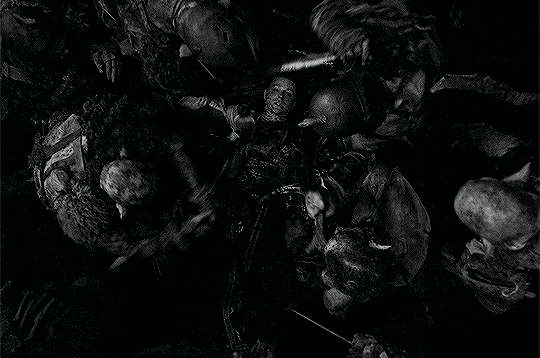

@love-and-doom asked me why didn’t the Valar or other Maiar intervene when Mairon was being corrupted/tortured by Morgoth? Or why didn’t Aulë tried to get Mairon back? Sauron himself answered to that: because he “chose it”, and he’s the true author of [his] own torment.
Free will is another major theme in Tolkien lore. And neither the Valar, and less alone any Maia, could do anything without Eru’s permission. And the moment a character sides with evil in Tolkien lore, it’s stuck with the consequences. And this goes for Marion, Adar and Celebrimbor. Because all of these characters are both victims and accomplices of Morgoth (the original source of evil), directly (Mairon and Adar), or indirectly (Celebrimbor).
Which also explains why Sauron hates and resents the Gods so much; he probably feels they have forsaken him, like they did with Middle-earth after the War of Wrath, hence him stepping in to rebuild and heal it (because no other Vala would); symbolizing his own desire of healing himself from Morgoth’s corruption.
Sauron in Truth Repented
In 2x01, we saw Sauron getting taught some humility by Adar and the Orcs unionizing against him, when he gets his physical form destroyed, by the means of Morgoth’s crown. Afterwards, Sauron is trapped in a cave for centuries, until he’s able to get out.

He, eventually, re-embodies and is able to recover his physical “fair form”, after centuries as a slimy dark substance.

When Morgoth was defeated, it was as if a great, clenched fist had released its grasp from my neck. And in the stillness of that first sunrise, at last, I felt the light of The One again. And I knew if ever I was to be forgiven... That I had to heal everything that I had helped ruin. Sauron tells Galadriel, 1x08
Soon, we see him brought low, depressed and unsure on what path to take; having a identity crisis. Some centuries trapped in a cave being goo will do that, even to a demigod (Maia).

We see him lingering on Middle-earth, and by the visual clues (wardrobe and sword) it can indicate that he might have dwelled among humans for a unknown period of time, and even found himself work as smith (sword).
The passage of time is not only hinted by his clothes, but when we, the audience, last saw him he was at Forodwaith (Northern Waste), and when he meets Diarmid, he’s in the Southlands; which means, he traveled all the way from the north to the southeast of Middle-earth.
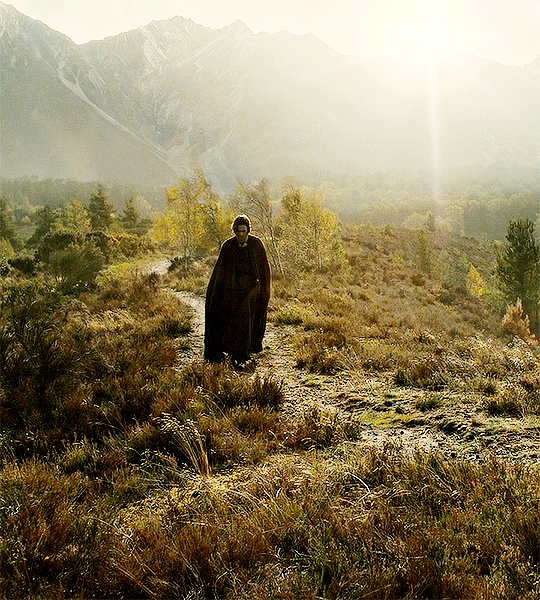
The Trials of Mairon: Diarmid
When Thangorodrim was broken and Morgoth overthrown, Sauron put on his fair hue again and did obeisance to Eönwë, the herald of Manwë, and abjured all his evil deeds. And some hold that this was not at first falsely done, but that Sauron in truth repented, if only out of fear, being dismayed by the fall of Morgoth and the great wrath of the Lords of the West. But it was not within the power of Eönwë to pardon those of his own order, and he commanded Sauron to return to Aman and there receive the judgment of Manwë. Then Sauron was ashamed, and he was unwilling to return in humiliation and to receive from the Valar a sentence, in might be, of long servitude in proof of his good faith; for under Morgoth his power had been great. Therefore when Eönwë departed he hid himself in Middle-Earth. The Silmarillion
There is a theory that Diarmid might have been Eönwë in disguise, sent by Manwë, and his mission was to test Mairon and bring him home to Aman. I subscribe to this theory, because not only it’s aligned with what Tolkien wrote, but because Amazon has limited rights to “The Silmarillion”, and needs to adapt and work around it.

And there’s some clues towards this in the dialogue itself:
That way lies death, friend. […] I know you’ve suffered. I can see it in your eyes. There’s another life waiting for you. You just have to turn toward it. […] A sure path may crumble, but there’s always another. Often, it can lead us someplace better. Someplace good. They say there’s places across the sea, a man can escape himself. Find another path. Perhaps another life. Come with us, if you like. Or, walk on. And keep chasing death. Choice is yours, friend.
Diarmid also wears the pouch of the King of the Southlands, which might be another clue; “A symbol of kings, long-dead […] My family served them.”
This is also connected with what Mairon tells Galadriel in 1x03: Be careful, Elf. The heir to this mark is heir to more than just nobility. For it was his ancestor who swore a blood oath to Morgoth. I am not the hero you seek. For it was my family that lost the war.
In "Rings of Power"; this pouch is symbolical of Mairon's blowing up his redemption, and falling back into evil.

The connection between the Southlanders and Morgoth was also a major theme throughout Season 1. This was, after all, the reason why the Elves kept watch over them for centuries: It has changed much, Watch warden. But the Men who live here have not. The blood of those who stood with Morgoth still darkens their veins. (Revion to Arondir; 1x01).
You were right to watch us. Because we are destined for the darkness. It's how we survive. Perhaps it's who we are. Who we will always be. Bronwyn to Arondir, 1x05
What we see here is that Southlanders were kept watch by the Elves to make sure they were fulfilling their penitence for siding with Morgoth, and obtaining their pardon from the Valar.
Hence Diarmid/Eönwë wearing the pouch of the King of the Southlands, as a test for Mairon: will you choose good and redemption (save Diarmid)? Or will you choose evil and Morgoth (the pouch)?
Diarmid: Nightmares again? What haunts you so? Mairon: I've done evil. Diarmid: All of us have done things that we care not to admit. Mairon: Not like I have. Diarmid: Find forgiveness. You are alive because you have chosen good. Mairon: But what of tomorrow? Diarmid: You have to choose it again. And the next day. And the next. Until it becomes a part of your nature.
And this makes even more sense with the sea serpent destroying the ship Diarmid and Mairon were traveling on, in the Sundering Seas, near Valinor. A sea creature, most likely, sent by Ulmo, the Vala of the sea. Or even Ossë, the Maia of Inner Seas, himself.

We have the Gods uniting to test Mairon and killing a bunch of humans in the process. Why I’m telling you this? Because the “Rings of Power” fandom has not yet grasped the concept of “being a God” and how Gods are d*cks, overall, who don’t care about individual lives, they look at the full picture and see reality in 5D. Like Sauron himself. And if they need to kill a bunch of people to accomplish their goals, they will. Even Eru sinks an entire island to punish its people, and He’s the ultimate good (and authority) in Tolkien lore.
And Mairon failed the test, because he chose Morgoth (the pouch), and left Diarmid to die.


The Trials of Mairon: Galadriel and Númenor
Sauron was of course not 'evil' in origin. He was a 'spirit' corrupted by the Prime Dark Lord (the Prime sub-creative Rebel) Morgoth. He was given an opportunity of repentance, when Morgoth was overcome, but could not face the humiliation of recantation, and suing for pardon; and so his temporary turn to good and 'benevolence' ended in a greater relapse. Tolkien Letter 153
Having failed one test, the Valar didn’t give up on Mairon, for they send him another: Galadriel. Who also turned her back on Heaven, by choosing to remain in Middle-earth due to her pride, and desire of hunting down Sauron. And, so, this time, they were both getting tested by the Gods. And even Mairon sees through her, in 1x02: At last, a little honesty. If you want to murder Orcs and settle a score, that's your affair. Don't dress it up as heroism.
When Mairon arrives at Númenor, he sees it as “the place across the sea” Diarmid told him about. Where he can find another path, another life. A island gifted by the Valar themselves to Men, and where they are ever watchful. And so, he believes this is where he can prove his good faith to the Valar and sought their forgiveness for his past sins and crimes under Morgoth.

However, Mairon recognizes that Galadriel can be a liability on his plan of staying at Númenor, not only due to her antagonistic atitude towards the Númenóreans, but also the bad blood between them and the Elves. And that explains his advises to her, in 1x03: “I suggest we set history aside for the moment and show some restraint. Let's try not to antagonize these people.”
When things turn sour in their meeting with Tar-Míriel, we see him employing his charming ways, and acting the diplomat: “It seems to me that our leaving presents some complications. Perhaps it'd be better if we stayed... […] Long enough, good Queen, to give you and your advisors adequate time to weigh our request. A few days, perhaps?”
Of course, Mairon’s intention is not to stay in Númenor for just a “few days”. He wants to stay there in servitude, and prove his good will to the Valar: “I have been searching for my peace for longer than you know. Please, for both our sakes, let me keep it.”
to receive from the Valar a sentence, in might be, of long servitude in proof of his [Sauron] good faith; The Silmarillion
When the petals of Nimloth, the White Tree of Númenor, fall, according to Queen-regent Míriel, the Faithful see in them the tears of the Valar, “a living reminder that their eyes and judgment are ever upon us.”

Which explains Mairon's next actions: after the meeting, he goes straight to Númenor forge, to find himself work there:
There is not another man on this isle that knows this craft better than I. I will shovel coal if needs be, I’ll splinter wood, I’ll shape a sea anchor for you, free of charge, sturdier than anything you have ever seen. How’s that? I’m here to start anew. Lend me that chance. Please. And I won’t forget it. Halbrand/Mairon asks for work at Númenor forge, 1x03
Mairon is told he needs a guild crest in order to be a smith in Númenor, and he’ll do just about anything to get it. And this is when his bounds to Morgoth and his old ways come to the surface: not only does he steal the crest from one of the smiths (and gets into a bloody street fight), but he also tells Ar-Pharazôn of Galadriel’s plans. And this was confirmed by Galadriel herself in 1x05: I wondered how the queen knew to waylay me at her father's bedside. It never occurred to me you'd hand me over for a guild crest.
And we see Mairon working at the forge, and he’s happy. It’s not random that the times we see Mairon truly happy in Season 1 is when he’s smithing; both in Númenor, and at Eregion, alongside Celebrimbor. This was what he was created to do and to be, by Eru himself. This is his purpose, and what’s he’s meant to be doing. Not getting high on power trips (Morgoth).


And this is a great contrast with Season 2: as Mairon goes deeper into evil, he embraces the sorcerer and neglects the smith. We barely saw him doing any actual smithing in Eregion, in Season 2, while in Season 1, he was involved in the entire process.
And, as Galadriel leaves, the petals of Nimloth, the White Tree of Númenor, fall. The Valar “cry”: my theory it’s in approval of Mairon’s decision of staying in Númenor, in servitude. He has proven his good will (“in truth repented”) and needs to stay on his current path (redemption is a process). But Míriel looks at it, all wrong (like her father will warn her about), and thinks it’s a warning to follow Galadriel, when it’s actually the other way around.
And 1x05, we see Galadriel acting behind his back and involving Míriel, Queen regent of Númenor, in her plans of getting herself an army to fight “Sauron” in the Southlands (the army she claims Sauron promised her, in 2x06).
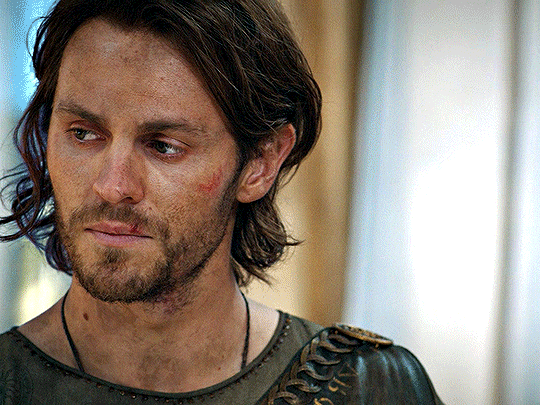
And Mairon is vexed. He doesn’t want any part in this; he wants his redemption. And this is very clear in this scene:
Míriel: My thanks, Lord Halbrand. I'm certain your fellowship will prove just as invaluable once we make landfall. Mairon: "Landfall?" Míriel: Galadriel informed us of your aspiration to unite your people. Mairon: Did she now? Galadriel: I trust she was not speaking in haste? Mairon: As a matter of fact, it was my intention... [to stay in Númenor] Galadriel: My companion is merely feeling the weight of his task. I have no doubt, come time, he will do his part. Míriel: Given that I've staked my name upon it, I should hope so. Edda: Queen Regent, your father has requested your presence in the tower. Mairon: "Galadriel informed us." Galadriel: I wondered how the queen knew to waylay me at her father's bedside. It never occurred to me you'd hand me over for a guild crest. Mairon: You used me. After I all but begged you to let me be. Galadriel: I have just convinced Númenor to send five ships and 500 men to aid your people and place a crown upon your head. Many might assume you used me. Mairon: Find another head to crown.

This is Mairon symbolically rejecting Morgoth. And this is the “good” he should have chosen. This is him passing the test, and a step closer to his redemption.
But Morgoth/Galadriel won’t give up, and she goes to the forge to persuade him into taking up the role of King of the Southlands.
I already talked about this on several posts; in Season 1, we see Galadriel being the “Morgoth” to Mairon’s “Sauron” on several occasions, by tempting him with promises of power. And this Númenor forge scene is a direct parallel with Morgoth tempting Mairon with promises of power in Aulë forge.
This idea is also present in Míriel's scene with her father, the king of Númenor, on the same episode, when Tar-Palantir warns her against going to Middle-earth and follow Galadriel:
Tar-Palantir: The kingdom! The kingdom is in danger. I must... Míriel: The danger has passed, Father. We are doing now what you always believed we must. We're restoring our connection with the Elves. I'm going to Middle-earth. Tar-Palantir: Míriel? Míriel: Yes, Father. It's me. Tar-Palantir: Don't go to Middle-earth. All that awaits you there is... Míriel: What, Father? What awaits me? Tar-Palantir: Darkness.
And this is true to both Míriel and Mairon, because darkness is what awaits for them there, should they follow Galadriel. Because, just like Adar tells her, in 1x06: It would seem I'm not the only Elf alive who has been transformed by darkness. Perhaps your search for Morgoth's successor should have ended in your own mirror.
And we see this dynamic with Galadriel and Mairon in the forge scene, where the pouch (Morgoth) is used as a plot device; while Galadriel wants him to take it, Mairon rejects it.
Galadriel: I was wrong to use you. For that, I'm sorry. Tomorrow, the queen will call you to audience. Your voice at that meeting may well decide whether this mission stands or falls. Help me. Mairon: I think I've helped you quite enough. Galadriel: Then help yourself. Stop fighting me, and together, let us fight them.
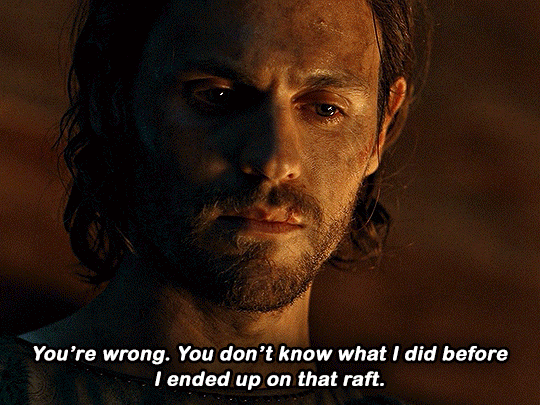

And this is when Galadriel tells him about her brother's death (although Mairon was already aware of this). But that's not what makes him reconsider, and essentially ruin his redemption. It’s when Galadriel says this:
The company I led mutinied against me. My closest friend conspired with the king to exile me. And each of them acted as they did… Because I believe they could no longer distinguish me… from the evil I was fighting.
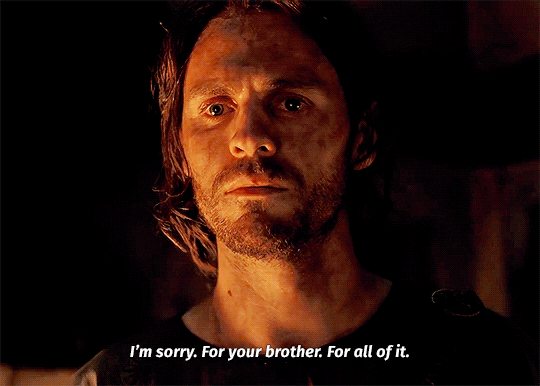
And this is personal to Mairon. Because of what happened with Adar and Orcs; not only they mutinied against him, but they could no longer distinguish him from Morgoth.
And this is related with what Adar himself tells Galadriel in 1x06: After Morgoth's defeat, the one you call Sauron… Devoted himself to healing Middle-earth, bringing its ruined lands together in perfect order. He sought to craft a power not of the flesh… But over flesh. A power of the Unseen World. He bid as many as he could to follow him far north. But try as he might… Something was missing […] For my part… I sacrificed enough of my children for his aspirations. I split him open. I killed Sauron.
Your sorrow cannot ease my pain. And nor will a hammer and tongs ease yours. There is no peace to be found for you here. And nor for me. No lasting peace in any path, but that which lies across the sea. I have fought for centuries, seeking to earn mine. This is how you earn yours.
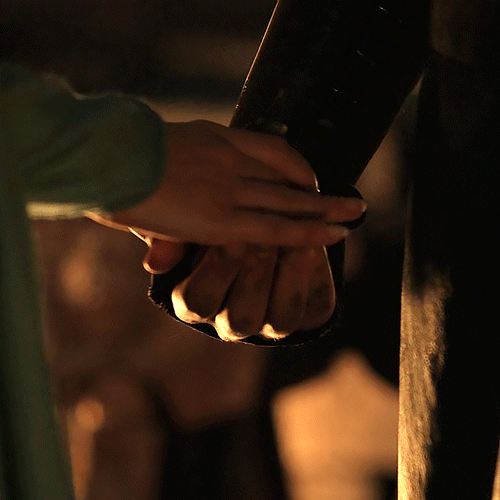
Find Forgiveness
And this is when everything collapses, and changes for Mairon. He now believes his redemption is connected to Galadriel and her forgiveness. But he’s deeply mistaken, because by following Galadriel and going to Middle-earth, all that awaits him there is darkness, like Tar-Palantir prophesied.
And that’s why Galadriel is connected to the Fall of Númenor visions: she's the “Morgoth” who brings "Sauron" back, like Gil-galad foresaw, in 1x01: “We foresaw that if it had, she [Galadriel] might have inadvertently kept alive the very evil she sought to defeat [Sauron]. For the same wind that seeks to blow out a fire may also cause its spread.”
By following Galadriel, Mairon chooses deception over redemption. And it’s like Elrond says to Galadriel in 2x02: “It was entirely of your choosing. Sauron looked inside you, plucked the very song of your soul, note by note, making himself out to be exactly what you needed. "The Lost King" who could ride you to victory.”
And this is exactly what Mairon does, hoping to earn Galadriel’s forgiveness, and redeem himself. And he makes his choice. And he chooses wrong. He fails the test; and he chooses Morgoth (the pouch), all over again.
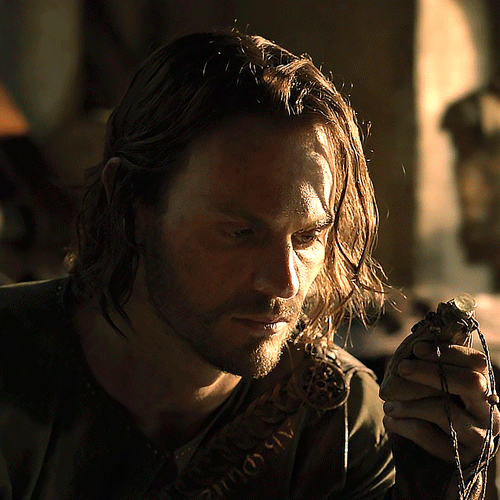
And in 1x06, we see Mairon helping people, and guiding them to safety. And he thinks it’s because of Galadriel’s influence on him, and not of his own doing. Because he’s a Maia, he was created as a servant, and he needs to serve someone, otherwise he’s lost.
Galadriel: Whatever it was he did to you, and whatever it was you did... Be free of it. Mairon: I never believed I could be... Until today. Fighting at your side, I... I felt... If I could just hold on to that feeling, keep it with me always, bind it to my very being, then I...
And when Galadriel tells him “I’ve felt it too”; it’s the confirmation and validation Mairon needed. He thinks she’ll be willing to bind herself to him, and keep him in the light, and he'll achieve the redemption he so desperately wants.
But Galadriel’s light is merely aesthetic; it’s the light of the Two Trees of Valinor, who shines on every Elf who was born during the Years of the Trees. But in her case it’s more perceptible, because of her legendary golden, shot with silver, hair. And it’s her beauty that blinds Mairon; the Maia who loves beautiful things.
Forgiveness takes an Age
Forgiveness doesn't come to folk like me. Sooner or later, they'll cast me out, you know they will. Estrid to Isildur, 2x03
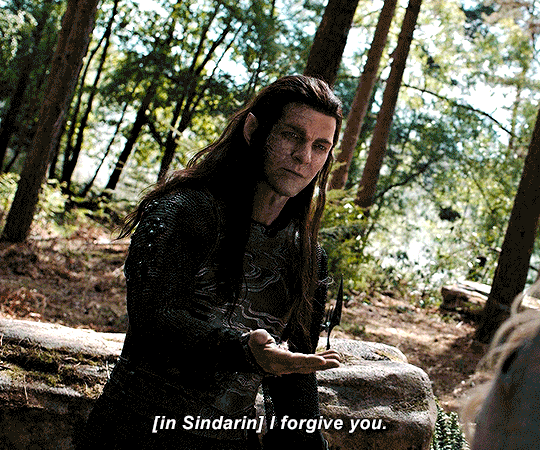
In Tolkien legendarium “forgiveness” is not just “earned”, it’s given, as well. And we see this with Frodo and Gollum in “Lord of the Rings”: it’s Frodo’s mercy and pity that ultimately allow Gollum to “redeem” himself, because he's the one who destroys the Ring, by falling down the volcano with it. Frodo, in “Fellowship of the Ring” believed Gollum deserved death and that Bilbo should have killed him when he got the chance, but Gandalf shares some wisdom with him on that topic. However, after he meets Gollum, he pities him and takes mercy on him.
And when Galadriel rejects his offer, Mairon sees it as a rejection of her forgiveness. She tells him: No penance could ever erase the evil you have done; and he sees this as confirmation of his worse fears, on a subconscious level (because he’ll try to redeem himself through the “rings of power” masterplan, still); he’s not worthy of redemption, and others will always cast him out. This is the turning point for him.
Because this is also a theme morally gray or villainous characters face in Tolkien lore (especially in The Silmarillion): they are always seen as irredeemable by others, and must die. But these characters are wrong, due to Tolkien’s ideas of redemption, rooted in Catholic faith (and this is what is called “unreliable narrators”, because “The Silmarillion” is written by the Eldar POV, and is a collection of facts, myths and gossip, essentially).
In Tolkien lore, “redemption” is a process, and a nuanced and complex idea. It’s broader than just one villain turning good overnight, because in the legendarium this process is not instantaneous. It’s pretty much like Diarmid tells Mairon in 2x01: it’s a process where the character has to progress towards good by conscious choice and free will: “you have to chose it again, until it becomes part of your nature”.
But Mairon never chooses this. And in Season 1 of “Rings of Power”, it’s exactly what Tolkien wrote: he in truth repents, temporarily turns to good and benevolence, but doesn’t see his redemption through as a result of his own choices. And the “pride” Tolkien talks about is personified in Galadriel, and him choosing to follow her, instead of staying in Númenor in servitude. But he means well throughout Season 1 and Season 2, too; when he embraces the next plot of his character arc, “Annatar the reformer”.
And this is Halbrand. And he was very much real, and not one of “Sauron’s illusions” or deceptions. He was Mairon seeking redemption and pardon from the Valar due to his crimes under Morgoth.
I'm planning on doing meta on "Annatar the Reformer" of Tolkien lore, too. But I got a feeling "he" is not over in "Rings of Power", just yet. I think that plot will continue in Season 3.
#the rings of power#rings of power#Sauron#sauron rings of power#rop sauron#sauron trop#Mairon rings of power#Halbrand#celebrimbor#Celebrimbor rings of power#Galadriel#Galadriel rings of power#diarmid#haladriel
193 notes
·
View notes
Text
Actually I'm so incredibly lucky to have The Silt Verses because it gives me the kind of character dynamics I desperately love and so very rarely find.
I am an ABSOLUTE sucker for characters who go "I will move heaven and earth for you. I will be driven to both great and terrible decisions for your sake because of how I am defined by you" but I do... NOT... care about romance. I Don't Care About Romance. I don't want it. I don't relate. My immersion hits a cliff there. I'm an aromantic Character Enjoyer and I do not care about shipping at all.
So as you can imagine, it's a challenge to find "I will do everything for you" character dynamics which, if not canonically romantic, end up being ships that get treated like canon if you try to talk about the characters in fandom spaces.
I am incredibly drawn to sibling media and I think it's largely because that's the primary way I've found these dynamics and they don't get treated as "come on it's basically a canon romance" by the main chunk of the fandom. I'm an FMA enjoyer, a Gravity Falls enjoyer, an Over The Garden Wall enjoyer--fuck I'm a Supernatural enjoyer, for this reason. Do you know what that's like? When Supernatural gets you because you're so hungry?
And then... The Silt Verses... Filled, FILLED, with these "I will move heaven and earth for you" kinds of dynamics--healthy, unhealthy, as sources of hope and sources of absolute destruction. Of course I'm here for it. Of course I'm clocked in.
But it SHOULD be hopeless for me. I mean the only actual sibling dynamics are just within backstories--Carpenter and her brother Em. Faulkner and his brother Charlie. Hayward has no siblings. Paige's aren't relevant. Faulkner and Carpenter have exactly this intense dynamic I love--same with Paige and Hayward--and then Hayward and Carpenter--and I should be taking the L because this always ends in ships.
But Jon Ware and Muna Hussen--who I owe my life to--very intentionally did not do that. Carpenter is aromantic. She gets to be that canonically. There's never a hint of romantic tension between her and Faulkner. When they call each other brother and sister, it's religious formality first, and then it's an actual found-sibling kind of bond.
Hayward and Paige, in like any other media, would have been a couple. The way they save each other, and lean on each other, and leave their old selves behind to become someone new together. It's obvious. I've seen it a million times. But when Jon Ware got asked in a Q&A about what Paige and Hayward -are- to each other ... look I just need to go with direct quotes to do the answer justice
I think maybe there’s also an implicit question there about whether there’s something romantic going on – maybe I’m reading into it, but that is something that’s on my mind a lot, so I’d love to talk about it more. ... I personally, I don’t like writing fictional characters where the most important moment in their narrative arcs is when they get together with the person they were always meant to get together with. ... And again, I think [give the people what they want] can send you in the wrong direction, one that ends up being essentially flattening – we don’t think, "if these characters hook up, OK, what new opportunities does that give us to explore them, to understand them in greater depth?" ... And after we released maybe one episode of The Silt Verses, I saw a couple of folks online going ‘oh, god, I hope this isn’t going to end with Carpenter and Faulkner hooking up,’. And you go, "oh my god, I hadn’t considered that as a possibility for a second, that’s not who they are and that’s not what the relationship is here" - but of course all of us are primed for it, that enemies-to-lovers thread that is so common. ... Because it was freeing because after Season 1, nobody is expecting or hoping that Hayward gets together with anybody. No-one wants that particularly!
And Shrue and Val come along... each of whom has intense interactions and kinds of relationships with the people they encounter but, still, no romance. And nothing among the high katabasians or the adjudicators. If there WAS any kind of romantic read with Rane toward Faulkner, it does nothing to overshadow what was happening there. I liked someone's likening it to Lady Macbeth and Macbeth. The Thing going on between them can't really be reduced to shipping.
We DO even get the family-related bonds and trauma I usually lean on. Paige with her dad. Faulkner with his dad. Carpenter dealing with the trauma of her Nana and brother. Shrue left in harrowing limbo about the safety of their (maybe non-existent) children and husband.
Anyway I didn't even mean this to be so long. I'm just so blessed and lucky to have character dynamics where they're screaming and sobbing each other's names and no one is pulling the "There's no platonic explanation for this" card. I'm so glad.
150 notes
·
View notes
Text
Worldbuilding in Flat Worlds
Oh, so you think I can't do worldbuilding on flat worlds?
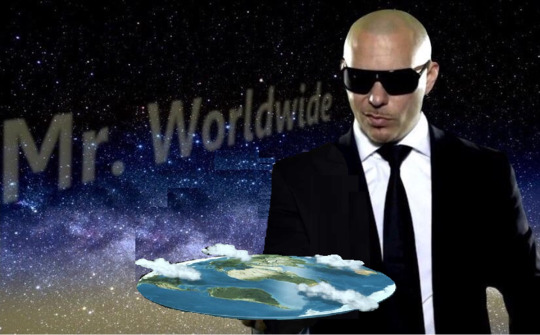
So, you might or might not have run into my rather hyperbolic advice that the first rule of worldbuilding is placing your equator. I still stand for it, and one of these days I would like to expand on that… But many on the notes have asked, and this is fair since it's worldbuilding: what about if my world is flat? Or a cylinder, or a ring, or other such shapes? While I can't cover every shape here (though I would like to try, eventually) I can tell you one thing or two about Flat Earths, Flat Worlds, Disc Worlds, however you would like to call them, and how you can do worldbuilding on them. You will be surprised at how much myth, fantasy and science fiction can mesh here. I apologize in advance for the lack of hard numbers in such things like gravity and orbits, but I can expand if you'd like.
This is going to be a LONG post, so more, way more, under the cut:
First of all, of course many cultures have thought of the Earth as flat, it makes intiutive sense. But this idea wasn't only about a flat Earth as a disc in the middle of nothing. This belief was also accompanied by many other beliefs about the sky, and what's under the earth (while I don't want to generalize, you see this sky-earth-underground motif in most cultures) and how the gods or God shaped it; so, not only the shape of the Earth, but the entire universe, a cosmology. While I could go into much depth on various cosmologies around the world (though I suggest you do!), I will explain the two "flat earths" that are more familiar to us in the Western world; the Hebrew and the Greek cosmology.
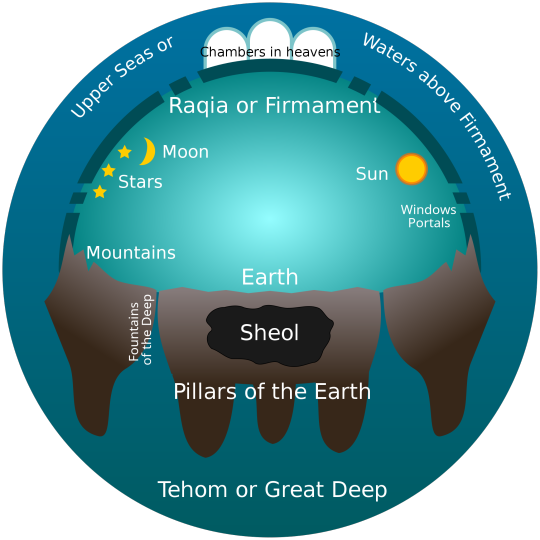
They usually don't teach you the cool lore in Sunday school.
So, what we see in the Hebrew cosmology is a flat earth, yes, but with a firmament that, unlike some might think, does not separate the heavens (as in sky) from the Earth, but rather creates a "vault" with Earth inside from the primeval ocean, as the firmament IS the sky. As you can read in Genesis 1:6-8, in the second day of creation, God divides the waters "under" and "above" the firmament. This idea of a primeval, chaotic ocean from where the creator God(s) create the world is a feature of Mesopotamian mythology (as well as many other unrelated mythologies), and I would love to expand on it, but let's focus on what the "flat" Earth looked like to the ancient Hebrews. You have a flat earth with the foundations on an endless abyss of water, which goes all around the firmament, an inmovable (the Bible mentions this several times) sky where God placed the Sun and Moon and stars to illuminate the Earth, and floodgates where the water for rain, hail and snow (and also the Great Flood) came from. And also Sheol, and the abyss of water, which along with the "heavens" in or beyond the firmament, take into more spiritual characteristics. I could go on, but as you can already see, this is a very complex cosmology, far from a single flat disc floating on nothingness.
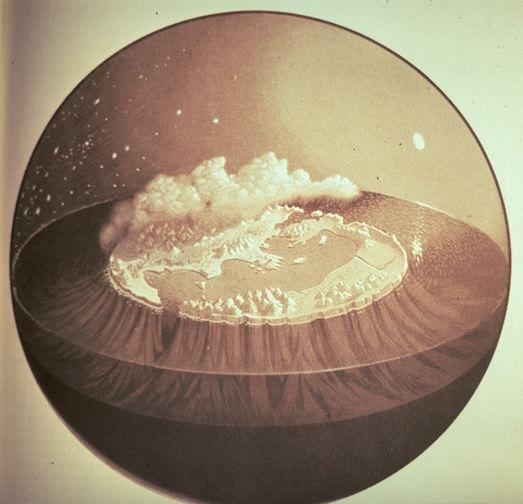
The world according to Homer (the other one)
Let's move on to the Greeks. Now, the ancient Greeks, like Homer, initially seemed to believe in a flat earth, with many parallels to the Mesopotamian (and Hebrew) conception of the world, with a firmament and a landmass surrounded by (or floating on, as per Thales who believed EVERYTHING WAS WATER) an ocean with Greece as the center (see below). However, this conception evolved over time. Anaximander imagined the Earth at the top of a cylindrical, inmovable pillar, but more interestingly, attempted to explain the movement of the Sun and the Moon, believing them to be, to quote Wikipedia, "circular open vents in tubular rings of fire enclosed in tubes of condensed air" surrounding Earth. This idea was later refined by Plato and Aristotle as 'celestial spheres' as paths for the planets (this included the Sun and the Moon) to wander. This concept was further explored by Plato, Aristotle, and many more, to extend to the rest of the planets (which also included the Sun and the Moon), as objects moving across "celestial spheres" inside an sphererical firmament. At this point, Greek philosophers were already thinking the Earth was some sort of sphere, even if only because a sphere was considered the 'ideal' shape, but also because they had started to notice that the Moon was also spherical, boats went under the horizon, and the shadow of Earth during eclipses was round, among many other things that current Flat Earthers don't care about. Eratosthenes was the first to calculate the sphere of the Earth with remarkable precision (you probably know this story if you've watched the old Cosmos with Carl Sagan), and from there, it was mostly accepted in the Hellenistic world that the Earth was in fact round. It was finally Ptolemy by his incredibly detailed astronomical work for the time who finally cemented this system of a round (NOT FLAT!) and unmoving Earth as the center of the universe and the celestial spheres.
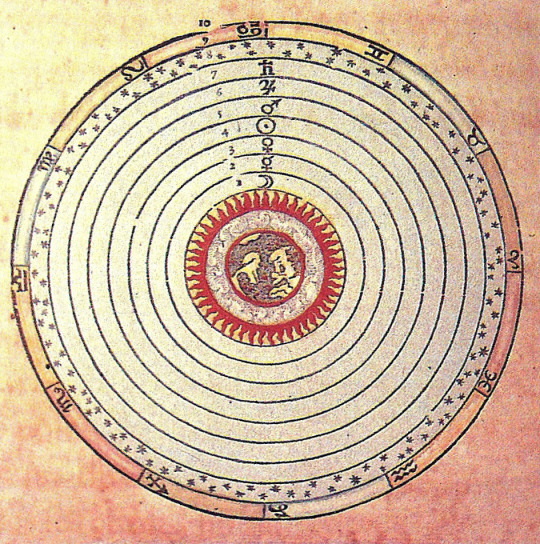
The Ptolemaic Universe. Not flat! Notice that the sphere right above Earth is on fire. This is because Earth was believed to be composed of the most base classical elements (Earth and Water), surrounded by a sphere of Air, and then later the sphere of Fire where the Sun orbited. The rest of the spheres were often associated with "Aether" or "crystal", but that's for another time.
As a note, as the Hebrews entered in contact with Hellenistic and later Roman civilization, they also adopted the concepts of the round earth and the "celestial spheres", which meshed really well with the concept of "the heavens" and the "circle of the Earth" mentioned in the Bible. With the rise of Christianity, this fusion of biblical and hellenistic cosmology endured for a long time. It's a myth that medieval Europe thought the Earth was flat, they all knew and teached the Earth was round… and fixed as the center of an universe made up of celestial spheres inside an spherical firmament of fixed stars. That concept endured much longer in Western thought, but that's for another time.
One interesting thing about flat earths in ancient cosomologies is that they often took the form of a circle, and that circle had a center. The center of the world. For the Greeks, it was the Omphalos stone in Delphi (this is where the expression 'navel of the world' comes from). For the Hebrews, it was the Temple at Jerusalem, and later medieval Christian maps (the T-O maps) set Jerusalem as the center of the world. This concept of a 'center of the world' in comparative mythology is called 'axis mundi', and as you can see, it takes particular importance in a world that is believed to REALLY have a center.
So, why the history lesson? It's fun, it might give you some ideas, but mostly it's to show you that the concept of a flat earth does not only imply a flat planet (indeed, the vision of Earth as just another planet took long to arise), but also a whole cosmovision of the world around it. To be fair, our current understanding of the universe, with round planets orbiting stars and galaxies and the Big Bang IS also a cosmovision. One based on scientific observation and understanding, but cosmovision nevertheless.
But perhaps what you wanted with a worldbuilding post is a world that is flat. Like a regular planet, just shaped as a disc. Let's discuss that. First of all, is such a thing possible to arise naturally? Most probably not. While I'm sure there might be at least one exception by some freak accident in the universe, maybe more, as a rule gravity tends to compress large objects into spherical shapes. A disc would eventually break up and become an asteroid field, or it would spin and bulge into a 'pancake shape' and eventually an oblate spheroid object, with a big equatorial bulge (yes, I'm going to use the word bulge a lot here). This shape might actually be common in many fast-spinning objects (that don't break apart) across the universe, and in fact you can find it in stars such as Achernar. Earth itself is a geoid, flattened at the poles and with an equatorial bulge (told you).
However, this does not mean that flat worlds are impossible. You could assume that the gods, or an ancient alien civilization (there's a lot of overlap here) made this disc of an indestructible material. How would such the dynamics of the world work then? Finally, here, is where our worldbuilding gets interesting…
Gravity:
Gravity on a disc would be very peculiar. To make a long story short, it would be stronger at the center and weaker at the edges, with the gravity pulling towards the center, which technically is the pole (I'm going to say South Pole because I'm from the Southern Hemisphere). So, if you threw a ball, it would be pulled towards the center/pole rather than the edges, and this pull would be in a perpendicular way, decreasing the farther you go from the center:
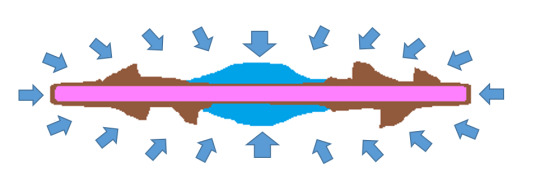
A very ugly drawing of an speculative flat world, with a core made of ~magical~ indistructible material, covered by earth, water and air. Note the direction of gravity and how water flows into a bulge on the center.
This would make for some curious effects; water and air would inevitably flood all the way to the center of the disc, where it would make a bulge, the sea level raising in a notable way there. One way to avoid this is to make the disc spin on its center, like a roulette, the centrifugal force of such a spin would make the gravity spread to the edges. Unfortunately, it's hard to calculate how fast would it be needed for it to 'even out' gravity in the whole disc. I can be sure it would be enough to tear normal worlds made of rock and metal apart, so this flat disc would have to be made of a strong, magical material (which really works well with the mythical 'God set the foundations of the Earth' motif)… or a complex structure of orbital rings inside (ultra-advanced tech artificial structures that transport matter in an opposite way to the spin, generating enough momentum so it doesn't pull apart), or some other kind of exotic matter. The spin would probably would not be noticeable to the inhabitants of the disc in their day to day lives, though, as the 'fixed' stars would move, I'm sure the inhabitants would incorporate in their calendars.
One important thing to remember about gravity is that it's not based in the size of an object, it's based on mass. You could have a (regular) planet smaller than Earth, but with the same gravity, so long as the mass was denser. Similarily you could have huge planets with Earth-like gravity as long as the inside is less dense (bubbleworlds, another thing I'm dying to talk about). So you could have, for example, a disc the size of Earth made of a magical or ultra-tech material (let's call it Newtonlith) where certain places inside the disc would be dense to create gravity fields inside the disc. In a normal setting, this would break it apart, but perhaps, if it's in a form of a spread out gradient, it wouldn't. This would have some very odd effects, which I leave to the reader to imagine.
(I'm of course, dismissing stupid concepts from modern flat earthers such as "Earth perpetually falling down" or "gravity doesn't exist", but I have to say, they do have some wacky worldbuilding)
The Edge and The Other Side:
So, if you get to the edge, gravity would feel strange, making it harder to you to keep going since it's pushing you perpendicularily to the center, until you actuall walk into The Edge, and gravity would feel level. It would be like walking on the oustide of a wheel. However, it's hard for me to imagine what this "edge" would look like. Assuming the disc spins, I would expect the edge to get thinner and thinner, smoothing out rather than being like a sharp "coin-like" edge… or, if it spins fast enough, in fact, more of a sharp cliff or, how could I define this? "Horizontal mountain chain". However, again, we're also assuming this whole thing is made of some magical or ultra-tech material, so the edge might as well be a flat expanse imposible to erode, like a coin edge, which might let you, quite literally, walk around the circle of the Earth. In fact, some enterprising civilizations might make a railroad or transport system all around the circle. Another thing about the Edge is that, because all the water would go to the centers of the disc, it would be very dry, and it also would have winds constantly circulating in the direction of the spin. No wall of ice, at least not as I imagine it; as we'll see later, the temperature on a flat Earth would be rather uniform unless there are other conditions affecting it.
One important thing is that, assuming this is a disc *floating* in space (no elephants or turtles…), is that the other side would be as habitable too. Remember, this case is actually one where the centers of the disc are two poles, and the edge is actually the equator! (HAHAHAHA, TOLD YOU THE EQUATOR WAS IMPORTANT, EVEN IN FLAT WORLDS) So yes, you could, in a way or another, cross over the edge (the equator!) to another whole new world, cross over to The Other Side. Assuming, of course, they get light and such, which is the next point…
Before that, though: regarding horizons; no, there wouldn't be a horizon in a flat world. You could see pretty much all the way until something like mountains block your sight. It's hard to find good estimates on exactly how far though, but humans can make out faint details up to 3km away in good conditions (coincidentially, that's around where the 'horizon' is in our Earth) and lights up to 48km away. Insert your joke about Legolas here.
Orbits, Day, Night and the Sky:
How would day and night work? There are Options.
Again, assuming our magical/ultratech indestructible disc, it could spin on an axis so that each side faces the star it orbits, like a spinning coin. This would be a weird thing, especially if the planet already spins on its edge/equator, but not physically impossible. The orbit of Uranus is similar, with one pole facing the sun during summer and the other during winter, but that means an almost century long day in its case (a year in Uranus is 84 Earth years) and a similar long "day" in an Earth-like orbit. But if this world was created to spin much like Earth, there won't be that much difference between our day and night. You could even tilt it to simulate seasons.
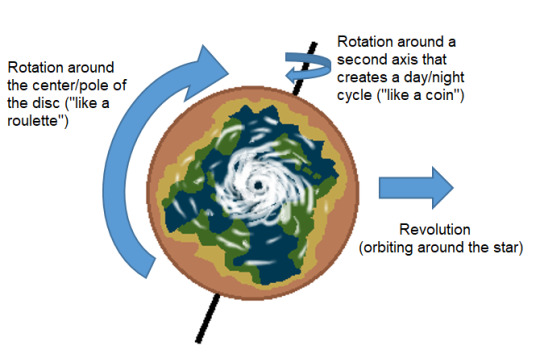
An example of the movements of a flat world given the above; rotation on its axis (that is, the center of the disk, rotation in another axis "like a coin" to give night and day, and revolution around a star. I also went the extra mile and gave it a climate like I will discuss later: a parched edge without water, with increasingly rainy desert, savanna and rainforest as you get to the center, and at last the central sea with a perpetual storm.
But I digress. You probably aren't here for a boring normal planet that orbits a star, no, no. You want the full mythical world experience, you want a world where the Sun and the Moon spin around the circle of the Earth, and fuck Copernicus. Let's leave aside what those 'luminaries' actually ARE for now, they can be some sort of magical tech objects or literal gods. How would that work?
You could have two kinds of luminaries here. The clever folks at the Flat Earth Society imagine a sun and a moon hovering over the Earth, spinning in a circular orbit about what we call the equator (in our round Earth, of course) as some sort of giant spotlight 32 miles across and a few thousand kms away, jumping and falling out of view, as I understand it. Same with the Moon. For a more classical approach, you could also have a sun and a moon orbiting your disc, which would be interesting, as the other side of the disc would also be illuminated while the other one is dark (in many ancient myths, the sun went into the underworld at night)
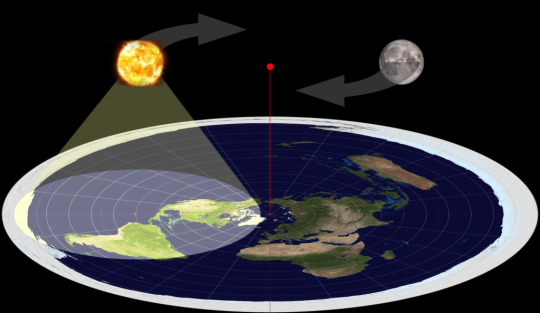
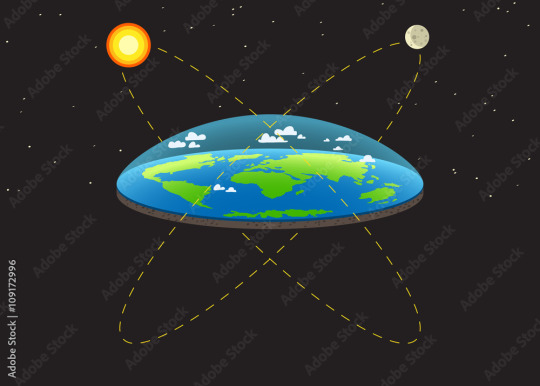
The two ways you could have mini-suns: either hovering above your disk or orbiting it. I was too lazy to make a graphic, so thanks to the Flat Earth Society I guess.
Like I said in the beginning, I haven't done the calculations on how such orbits would work, other that they would be complex, and not natural or stable at all. But after all, suns 32km across that hover over a flat world aren't exactly natural. If there is a place to insert gods and magic shit, this is one, though a fusion or black-hole powered spotlight that completes a very complicated orbit following ancient programming is also an option depending on what kind of setting are you doing. You could watch some videos of people debunking actual flat earthers to get a few ideas on how they explain the whole sun thing (spoilers: they just don't believe in eclipses, which indeed would be impossible here, unless magic is involved).
Both options have VERY important implications on the climate. The first one, with a disc orbiting a star and spinning to get day and night, would mean that the disc would get the same amount of light all over it, thus having the same overall temperature, without any latitudes. The second one(s), depending on the orbits of the suns, means you could have "tropical" areas and cold areas depending on where the sun's "spotlight's" points, either as a regular orbit over an equator, or a more complicated one that might not correspond to what we would expect. Funnily enough, Terry Pratchet's Discworld's sun has such a complicated orbit it's never really explained, it even crosses the legs of the elephants upholding the Discworld sometimes.
Speaking of which, THE Discworld of course moves across space on the back of 4 elephants standing on the shell of Great A'tuin (awesome name for your Torterra in Pokémon btw), and its movement is apparently so significant that the astrologers have to regularly change their zodiacs. And indeed, a flat world would also move around its galaxy if it existed, and carrying its own fantasy sun, it wouldn't need to orbit any star to be habitable. Our own Sun is moving with our entire solar system on tow (or rather orbit) at a speed of, holy shit I had to look this up, 828,000 km/hr. However, even at this speed, the stars seem fixed to us, a whole spin around the center of galaxy (a galactic year) takes 225 million years. Still, the stars are moving like us, in fact, some constellations are in slightly different positions from ancient times, just not at the pace in Discworld.
As a final note, I believe a moon with enough gravitational pull would cause tides as it orbits the flat disc much like on Earth. Would be funny if an actual normal moon like ours orbited a flat world, with a small sun on inside its orbit (not too far from the Ptolemaic universe, actually)
Geology and Climate:
Like I said, we're assuming this flat world is made of either some sort of ultra-tech exotic matter, or was just straight created with magical material. So you would think geology would be pointless to discuss, right? Not so fast. There's some assumptions we can make. First of all, there would be no plate tectonics. Plate tectonics, of course, need an active mantle and core, which a flat world just cannot have at least on the size of Earth. So no earthquakes or volcanoes, unless there's magic involved (Terry's Discworld, which is based on Hindu mythology, played with this by having the elephants holding it up move ocassionally, causing earthquakes) So, a world with less natural disasters, wonderful, right? Sure, but in the long run (millions of years), it's tectonic activity that keeps the Earth alive, replenishing CO2, moving the continents around stimulating evolution and changes in climate and the water cycle. This can be replaced by some magical means, though that means that Something Magical is doing Stuff in your world, (you know, besides the whole flat world thing) and you better contemplate what does it mean for your setting/story. Similarily, one strange thing about geology in flat worlds is that, as mentioned, assuming gravity points to the center(s)/poles, there would be a pull towards there, so mountain peaks would be taller and pointing towards the edge of the disc, and as we will see below, also face greater erosion from there, as the winds and water would also move towards the center/pole.
What about climate? That one depends on how your light sources work. But in general, without poles or equator (well, they exist, but you know), the whole disk surface(s) would recieve equal light all year. Which means no seasons and not climate variation. Seasons are possible by tilting the disc, but overall, the climate in a disc world would be stable. Or would it? By the sheer morphology of a disc, not only water would flow into the center, but also air, and in the case of a spinning disc, it would spin into it. Air would flow into the center into powerful winds: how powerful? Difficult to say, but perhaps geography like mountains and hills could moderate them. If there was no spin, I imagine both water and air would accumulate in a large inner sea (as water would, in one way or the other, flow towards it, and water cannot be denied) and high pressure which could be an odd bulged sea with surprsingly calm weather. However, there's another option. Astronomers have studied tidally locked worlds, worlds where one side faces their star all the time. In this case, the convection currents flows from the light side flow to the dark side, creating strong winds and perhaps, assuming there is water, a perpetual storm in the light side. This has a parallel in our case, as the air in a flat world will all spin around the center, with no other way to go, and with it, it will be where all the heat and energy of the atmosphere (atmodisc?) accumulates. In this world, the center of the world (or at least, this side of it…), the axis mundi, would be the eye of a gigantic eternal typhoon.
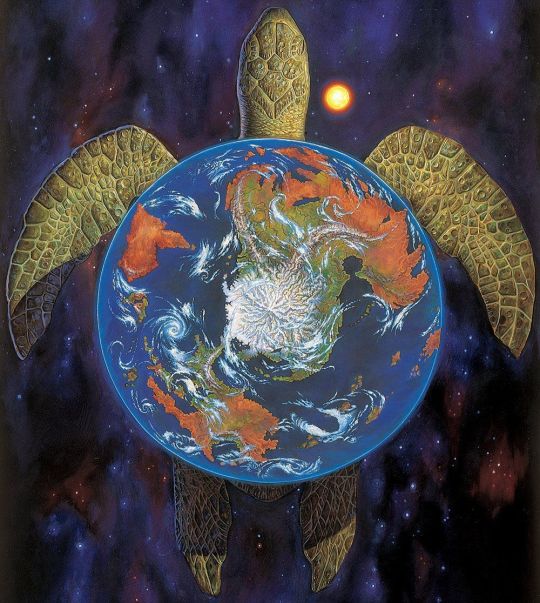
OOOH DISCWORLD I'M HOWLING TO THE MOON
What would geography, life and culture be like in such a world, given all the things I've told you? Well, that's the most fun part. It's up to you to imagine it. I personally don't find flat worlds all that engaging (sorry, Terry), I feel more comfortable with my good old spherical worlds with tropical latitudes and all that, or other more futuristic stuff things like ringworlds or Dyson spheres (which I hope to cover in another post). But I hope I gave you enough information and ideas so that the ones you might create are both original and believable.
Thank you for reading this, I hope you enjoyed it and it inspired you to do some worldbuilding! If you would like to see more, I would be VERY grateful if you gave me a tip and some suggestions in my ko-fi below, especially as my country here in the other side of the disc is under the rule of a libertarian fascist idiot, so every little help does indeed help a lot! Follow me and stay tuned for some more wacky worldbuilding and rants about the Southern Hemisphere.
#cosas mias#worldbuilding#fantasy#writing#writing advice#flat earth#I spent a lot of time on this one so I hope you reblog#and I resisted to post an Earth-chan meme so you should be grateful actually#biotipo worldbuilding
512 notes
·
View notes
Text
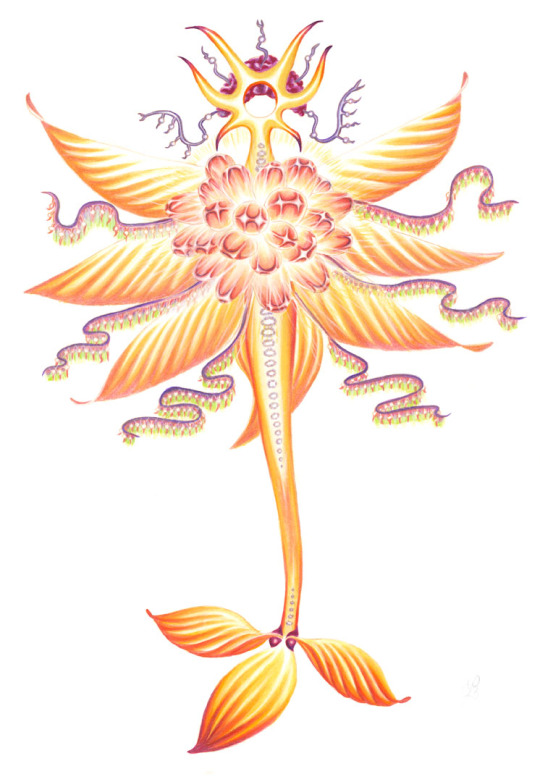
Hope
'You have a rare and marvellous spirit...'
A few weeks ago, I did an illustration of Solas's spirit form and got to wondering what my Lavellan might look like as a spirit, and what their nature might be. There are a number of allusions in Dragon Age: Inquisition that the Inquisitor's spirit is unusual, and since all the lore drops in DATV I've been wanting to explore what that might mean. We don't know if it's unusual or if it's just down to the Anchor--Cole says it makes them 'more', but there are other things mentioned here and there that there's something weird about them anyway. Hope seems like a good bet for their nature given all the events in the story, so this is what I based the design on.
I chose 8 'wings' as a reference to one of my favourite films, Angel's Egg, where the coelacanth is used as an allegory for faith. Coelacanths are one of the oldest fish species on Earth and were thought to be extinct until the 1920s, when a live one was caught off the coast of South Africa. Before this, there were only fossil records. Coelacanths have 8 fins, with their tailfin having 3 lobes. It felt like a fitting reference to make given that both Angel's Egg and DAI are stories about faith and hope.
The spindly bits are based on siphonophores, which are deep sea creatures that, instead of growing larger, create duplicates of themselves with single functions. E.g., some parts only have mouths, for eating. Long strings of them live in the open ocean, and to me they look like musical notation--this also fits with the line 'everything sang the same' and how Solas and Lavellan's speech is in the same cadence. It's also how I imagine the relationships between spirits to function; they're all parts of a larger body, with differing functions to sustain the whole.
The 'head' is designed to look a bit like a starburst with parhelia or sundogs. (They're called sundogs because it was thought that they were the dogs Zeus walked across the sky by the ancient Greeks.) They're considered a good luck omen i.e. a hopeful sign. The colour palette is based on a sunrise bc 'The dawn will come' is the hymn sung by Andrastians in DAI.
The above quote is said by Solas in the infamous Crestwood scene.
85 notes
·
View notes
Note
if you were given the reins to cassie sandsmark, what would u do 🎤
MAKE HER A LESBIAN!!!!! !!! !!!!!!!!
okay but to be more specific, i would want to explore like the concept of what being ‘Wonder Girl’ means to her, alongside just what being a GIRL means for her in general. how she has felt stepping into this legacy Donna gave to her where there is like… this amount of pressure to be a specific type of girl, to be a role model, to fit into the ideal of what The Wonder Woman’s sidekick should be… how that does and doesn’t mesh with who Cassie Sandsmark herself is. Exploring the ways she tried to change herself as she grew up to fit the idea of Wonder Girl and like, idk like. i would write a story of early 20’s Cassie trying to reclaim the messy rowdy un-girly teen-girlhood she denied herself once the Geoff Johns era hit. like. i’ve more eloquently elaborated on my Cassie thoughts in this post, but telling a story ABOUT her just letting herself… Exist like that. Letting herself say ‘fuck that’ to the ‘princess girl’ mask she put on. I’d need to be more sober to put into specific words what that story’s plot would be about, but like, I’m imagining her in a situation where she’s not surrounded by anyone who knows her already so she’s not dealing with these preconceived notions of who she is (maybe she's in space! maybe she's just undercover somewhere on earth! who knows!), and she just lets herself be more like that "'all elbows and knees' fourteen year old girl" (<- john byrne quote description of how he created her) she used to be and realizes that fuck she misses being able to just exist like that instead of… putting herself through a million filters and masks to be more presentable. and also she would kiss a girl during all of this (something something realizing that when she saw pretty girls like Cissie and it would make her feel conflicted and angry it wasn't jealousy about wanting to be like them, it was that 'GET OUT OF MY SCHOOL' crush mentality)
179 notes
·
View notes
Text
About the entanglement of "science" and Empire. About geographic imaginaries. About how Empire appeals to and encourages children to participate in these scripts.
Was checking out this recent thing, from scavengedluxury's beloved series of posts looking at the archive of the Budapest Municipal Photography Company.
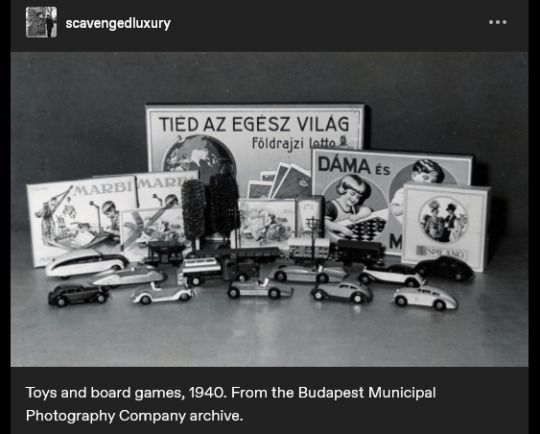
The caption reads: "Toys and board games, 1940."
And I think the text on the game-box in the back says something like "the whole world is yours", maybe?
(The use of appeals to science/progress in imperial narratives probably already well-known to many, especially for those familiar with Victorian era, Edwardian era, Gilded Age, early twentieth century, etc., in US and Europe.)
And was struck, because I had also recently gone looking through nemfrog's posts about the often-strange imagery of children's material in late nineteenth- and early twentieth-century US/Europe. And was disturbed/intrigued by this thing:
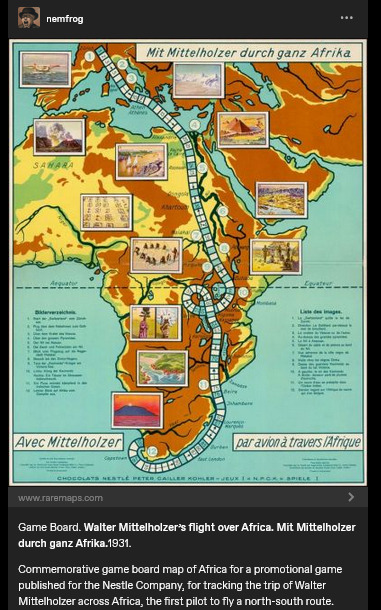
Caption here reads: "Game Board. Walter Mittelholzer's flight over Africa. [...] 1931. Commemorative game board map of Africa for a promotional game published for the N*stle Company, for tracking the trip of Walter Mittelholzer across Africa, the first pilot to fly a north-south route."
Hmm.
"Africa is for your consumption and pleasure! A special game celebrating German achievement, brought to you by the N*stle Company!"
1930s-era German national aspirations in Africa. A company which, in the preceding decade, had shifted focus to expand its cacao production (which would be dependent on tropical plantations). Adventure, excitement, knowledge, science, engineering prowess, etc. For kids!
Another, from a couple decades earlier, this time British.
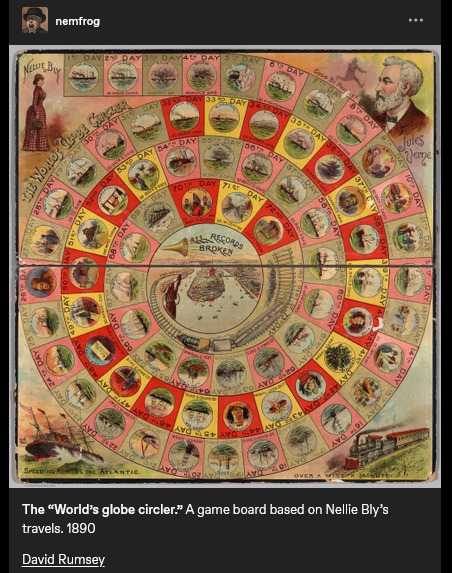
Caption reads: "The "World's globe circler." A game board based on Nellie Bly's travels. 1890." At center, a trumpet, and a proclamation: "ALL RECORDS BROKEN".
Same year that the United States "closed the frontier" and conquered "the Wild West" (the massacre at Wounded Knee happened in December 1890). A couple years later, the US annexed Hawai'i; by decade's end, the US military was in both Cuba and the Philippines. The Scramble for Africa was taking place. At the time, Britain especially already had a culture of "travel writing" or "travel fiction" or whatever we want to call it, wherein domestic residents of the metropole back home could read about travel, tourism, expeditions, adventures, etc. on the peripheries of the Empire. Concurrent with the advent of popular novels, magazines, mass-market print media, etc. Intrepid explorers rescuing Indigenous peoples from their own backwardness. Many tales of exotic allure set in South Asia. Heroic white hunters taking down scary tigers. Elegant Englishwomen sipping tea in the shade of an umbrella, giggling at the elephants, the local customs, the strange sights. Orientalism, tropicality, othering.
I'd lately been looking at a lot of work on race/racism and imperative-of-empire in British scientific and pop-sci literature, especially involving South and Southeast Asia. (From scholars like Varun Sharma, Rohan Deb Roy, Ezra Rashkow, Jonathan Saha, Pratik Chakrabarti.) But I'd also lately been looking at Mashid Mayar's work, which I think closely suits this kinda thing with the board games. Some of her publications:
"From Tools to Toys: American Dissected Maps and Geographic Knowledge at the Turn of the Twentieth Century". In: Knowledge Landscapes North America, edited by Kloeckner et al., 2016.
"What on Earth! Slated Globes, School Geography and Imperial Pedagogy". European Journal of American Studies 16, number 3, Summer 2020.
Citizens and Rulers of the World: The American Child and the Cartographic Pedagogies of Empire, 2022.
Discussing her book, Mayar was interviewed by LA Review of Books in 2022. She says:
[Quote.] Growing up at the turn of the 20th century, for many American children, also meant learning to view the world through the lens of "home geography." [...] [T]hey inevitably responded to the transnational whims of an empire that had stretched its dominion across the globe [recent forays into Panama, Cuba, Hawai'i, the Philippines] [...]. [W]hite, well-to-do, literate American children [...] learned how to identify and imagine “homes” on the map of the world. [...] [T]he cognitive maps children developed, to which we have access through the scant archival records they left behind (i.e., geographical puzzles they designed and printed in juvenile periodicals) [...] mixed nativism and the logic of colonization with playful, appropriative scalar confusion, and an intimate, often unquestioned sense of belonging to the global expanse of an empire [...]. Dissected maps - that is, maps mounted on cardboard or wood and then cut into smaller pieces that children were to put back together - are a generative example of the ways imperial pedagogy [...] found its place outside formal education, in children's lives outside the classroom. [...] [W]ell before having been adopted as playthings in the United States, dissected maps had been designed to entertain and teach the children of King George III about the global spatial affairs of the British Empire. […] [J]uvenile periodicals of the time printed child-made geographical puzzles [...]. [I]t was their assumption that "(un)charted," non-American spaces (both inside and outside the national borders) sought legibility as potential homes, [...] and that, if they did not do so, they were bound to recede into ruin/"savagery," meaning that it would become the colonizers' responsibility/burden to "restore" them [...]. [E]mpires learn from and owe to childhood in their attempts at survival and growth over generations [...]. [These] "multigenerational power constellations" [...] survived, by making accessible pedagogical scripts that children of the white and wealthy could learn from and appropriate as times changed [...]. [End quote.] Source: Words of Mashid Mayar, as transcribed in an interviewed conducted and published by M. Buna. "Children's Maps of the American Empire: A Conversation with Mashid Mayar". LA Review of Books. 11 July 2022.
Some other stuff I was recently looking at, specifically about European (especially German) geographic imaginaries of globe-as-playground:
The Play World: Toys, Texts, and the Transatlantic German Childhood (Patricia Anne Simpson, 2020) /// "19th-Century Board Game Offers a Tour of the German Colonies" (Sarah Zabrodski, 2016) /// Advertising Empire: Race and Visual Culture in Imperial Germany (David Ciarlo, 2011) /// Learning Empire: Globalization and the German Quest for World Status, 1875-1919 (Erik Grimmer-Solem, 2019) /// “Ruling Africa: Science as Sovereignty in the German Colonial Empire and Its Aftermath” (Andrew Zimmerman. In: German Colonialism in a Global Age, 2014) /// "Exotic Education: Writing Empire for German Boys and Girls, 1884-1914". (Jeffrey Bowersox. In: German Colonialism and National Identity, 2017) /// Raising Germans in the Age of Empire: Youth and Colonial Culture, 1871-1914 (Jeff Bowersox, 2013) /// "[Translation:] (Educating Modernism: A Trade-Specific Portrait of the German Toy Industry in the Developing Mass-Market Society)" (Heike Hoffmann, PhD dissertation, Tubingen, 2000) /// Home and Harem: Nature, Gender, Empire, and the Cultures of Travel (Inderpal Grewal, 1996) /// "'Le rix d'Indochine' at the French Table: Representation of Food, Race and the Vietnamese in a Colonial-Era Board Game" (Elizabeth Collins, 2021) /// "The Beast in a Box: Playing with Empire in Early Nineteenth-Century Britain" (Romita Ray, 2006) /// Playing Oppression: The Legacy of Conquest and Empire in Colonialist Board Games (Mary Flanagan and Mikael Jakobsson, 2023)
#mashid mayar book is useful also the Playing Oppression book is open access online if you want#in her article on slated globes mayar also mentions how european maps by 1890s provoked a sort of replete homogenous filling in of globe#where european metropole thought of itself as having sufficiently mapped the planet by now knit into neat web of interimperial trade#and so european apparent knowledge of globe provided apparently enlightened position of educating or subjugating the masses#whereas US at time was more interested in remapping at their discretion#a thing which relates to what we were talking about in posts earlier today where elizabeth deloughrey describes twentieth century US#and its aerial photographic and satellite perspectives especially of Oceania and Pacific as if it now understood the totality of the planet#ecologies#tidalectics#geographic imaginaries#mashid mayar#indigenous pedagogies#black methodologies#tigers and elephans#victorian and edwardian popular culture#my writing i guess
140 notes
·
View notes
Text

Book: Her
Pairing: Rosé x female reader
Warning: fluffiness and mention of hard career
Words:867
Quote: „I would not wish any companion in the world but you." William Shakespeare.
In the overfilled city of Los Angeles, nestled amidst rolling hills, loud noises, many crowds across the streets, a lot of architecture and blooming meadows, there resided two souls destined by the stars to meet and entwine their fates. You who has the name Y/N, a gifted photographer who was hired by the vogue with an eye that saw the world's beauty in every shadow and light, and Rosé Park, a K-Pop singer whose voice could summon tears from even the hardest hearts. A member of one of the most famous girl groups called blackpink.
The future of the blonde dyed woman unknown since she recently just debuted with her first solo album, many tears shed which reminded of water filled oceans. The amount of love like no other written in every lyric, heartbreaking lyrics that broke hearts with each beautiful vocals.
A weight of having to be perfect still weighted on Rosé's shoulders. Since she had a reputation of the perfect singer in the k-pop industry as a blackpink member. It left her more vulnerable as a solo artists with an unknown music journey in the future. Each blackpink member is trying to break out of the "perfect" reputation. Jennie even released a rap about the management holding them back from achieving big things in the music industry in a ad.
The tale begins one fateful award event on a certain night, when the event was alive with the sounds of the loud conversation of celebrities. Lights glowed like stars fallen to earth, and the scent of perfumes and blooming adrenaline filled the air. You, ever the observer of life's fleeting moments, wandered through the crowd with your camera, capturing the joyous faces and tender celebrities as only humans being scenes that unfolded before your eyes
As night descended, the event reached its crescendo with the arrival of Rosé, the golden voice loved by many on stage with a baby pink mic in her hand. Her voice, rich with emotions while sweet like honey, filled the air with melodies that spoke of love, being lost, and longing. You, drawn by the haunting beauty of her song, found yourself standing at the edge of the crowd, your heart thrumming in time with the music. You could feel the emotions she poured in her song's through your veins.
Your eyes met across the sea of faces, and in that moment, a spark ignited. Rosé's voice faltered as he gazed upon you, a vision of grace and elegance, your camera poised like an artist's brush while she continued to sing, but her heart now sang for you alone.
After Rosé's performance, she sought out the mysterious photographer. Rosé found you siting next at another celebrity. You looked absolutely breathtaking in her opinions which made her not wanting to lose an opportunity to have a conversation with you.
"Hi pretty, you look lonely. You caught my eyes while I was performing. A beautiful camera by the way." said Rosé while her australian accent could be heard, " your presence has inspire my soul. I am but a humble singer, yet I feel compelled to capture the essence of the beauty in song, as thou dost capture the world in thine art."
Your cheeks flushed with the warmth of her words, replied, "Good darling, your voice has moved me like no other. I am Y/N, a seeker of truth and beauty through the lens of my camera. Might I have the honor of capturing the likeness, that I may remember this night forever?"
Rosé was grateful that she had some self-control otherwise she would've flushed red cheeks by your reply. Your words took her breath literally away.
Thus began your journey of love, each discovering the depths of the other's soul through your shared passion for art. Both of you spent countless hours together, exploring the event later even a little bit of LA and surrounding crowds, capturing the world's wonders in photograph and song.
Rosé would sing as you photographed, her melodies weaving through the air like golden threads, binding your hearts ever closer. You, in turn, would find new inspiration in Rosé's music, your photographs revealing the hidden beauty that her voice evoked.
Your love for each other blossomed, unfettered by the trials and tribulations that life often brings. Both of you were kindred spirits, united by your art and your love for one another. Your bond with Rosé grew ever stronger, a testament to the power of love to transcend the boundaries of time and space.
Years passed, your love story became legendary in the music industry. The music industry was forever changed by both of your presence, and the memory of both of yours love endured, passed down through generations of singers as a symbol of the enduring power of art and the human spirit.
And so, in the twilight of your lives, you and Rosé, your hearts still entwined, looked back upon your journey together with gratitude and joy. For you both had found in each other a love that transcended the ordinary, a love that was truly extraordinary.
#blackpink imagines#blackpink roseanne#blackpink rosé#blackpink x you#blackpink x y/n#blackpink x reader#rosé park#rosé imagines#rosé fanfiction#rosé x you#rosé x y/n#rosé x reader#kpop imagines#kpop x reader#kpop x y/n#kpop x fem reader#kpop x you#no smut#william shakespeare#fan fiction author#reading recommendations#worth reading#romance#inspiring quotes#fanfiction recommendation#authorforrosie blog#writers on tumblr#writing community#love is love#lgbtq community
71 notes
·
View notes
Text
Franco colapinto| Caffeine
Pairing franco female reader
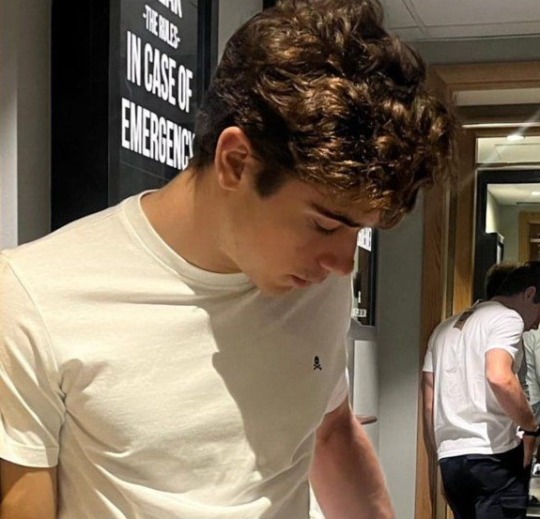

Warning smut, pinv, love at first sight
The café was cozy and bustling, tucked away in the corner of a charming little street in Monaco. Franco Colapinto, a celebrated Formula 1 driver, had stumbled upon it during his winter break. For once, the roar of engines and blinding flashes of cameras were replaced by the soft clinking of cups and murmured conversations. He was used to adrenaline, speed, and applause, but something about this quiet escape felt… grounding.
That was when he saw her.
Behind the counter stood a girl with chestnut brown hair tied in a messy bun, a pen tucked behind her ear, and a smile that seemed to light up the room. Her name tag read Y/N. She was graceful, quick on her feet, and laughed in a way that made everything else fade into the background.
Franco didn’t believe in love at first sight, but in that moment, he felt something shift within him.
The next day, he returned. And the day after that. For someone who thrived on risk and competition, his heart pounded nervously every time he ordered his coffee.
“Double espresso again?” Sophia asked with a teasing smile after his third visit.
“Yeah, you could say I’m a creature of habit,” he replied, scratching the back of his neck.
“You must be new around here,” she said, leaning slightly over the counter. “I’d remember someone with an accent like that.”
“I’m here for a break,” he said, keeping his answer vague. He wasn’t sure he wanted her to know who he was just yet. For once, he wanted someone to see franco, not the celebrity.
Y/N, a college student juggling her studies and her part-time job, didn’t press further. She liked that he was polite, funny, and surprisingly down-to-earth.
Days turned into weeks. Franco made the café his second home. He learned that Y/N was studying literature, that she loved old movies, and that she had a habit of doodling little flowers on napkins when the café was slow. He also learned that she had a sharp wit and wasn’t easily impressed.
One evening, as the café was winding down, Franco finally gathered the courage to ask her out.
“Y/N,” he began, leaning against the counter, “would you let me take you out for dinner? I promise it’ll be fun.”
Her smile faltered. “Franco, you’re sweet, but… I’m not looking for anything serious right now. I have school, work, and… I just don’t think I can do this.”
Her rejection stung, but Franco wasn’t one to give up easily.
Determined, he stepped up his efforts. He brought her flowers with little notes about how her smile brightened his day. He started helping clean up the café when things were busy, insisting that he just “needed the exercise.” He even began learning about her favorite books and quoting lines to make her laugh.
Slowly but surely, Y/n began to lower her guard. She saw the sincerity in his eyes, the way he listened when she spoke, and how he didn’t try to rush her into anything.
One cold evening, as they closed up the café together, she sighed and looked at him.
“Franco… maybe I was wrong,” she admitted softly. “You’re… different. I’d like to give this a try.”
That night, they went for a late dinner, talking and laughing as if they’d known each other forever.
When franco walked her home, the tension between them was undeniable.
“Y/N,” he said, brushing a strand of hair from her face, “you’re incredible. I don’t think I’ve ever felt this way about anyone.”
She leaned into him, her lips meeting his in a kiss that was slow, tender, and electrifying all at once.
When they stepped into her apartment, the world outside ceased to exist. Their connection deepened as they explored one another’s vulnerabilities, their kisses turning urgent, their touches leaving no part of each other unexplored.
Franco slowly slid his one hand inside her undie, while roughly kissing her. His one hand was drawing circles on her clit while his other hand was kneading her breast. His mouth was doing wonders on her chest.
You were truly a moaning mess then. Both of your hands were playing with his hair.
He slowly removes his hand from your clitoris and puts his finger inside you.. he starts moving his fingers. First, it was one finger and then two. Then three.. he went from slow to fast... when you were about to cum he started to kiss you.. on the lips... lower lips.. he slowly moves to your clit again making you groan. From kissing he went to roughly suck your clit while pinching both of your breasts.
You were on cloud 9. You cum all over again and he cleans you with his mouth.. "just put it in franco.. I just can't..." " Be patient baby girl... I am gonna make you feel good". He inserts himself into her... and starts to pound into you.. the to and fro motion was so good.. first it was missionary... you both were staring into each other's eyes... then he just flipped you with his one hand and started to take you from behind.. honestly you were shocked by his strength but it was hot.
He flipped you again this time it was lotus and then another position then another...
Franco’s hands were strong yet gentle, and Y/n responded with a passion she hadn’t realized she was capable of. That night, they let themselves be vulnerable, their bodies speaking in a language words couldn’t capture.
As they lay tangled in each other’s arms afterward, Franco pressed a kiss to her forehead. “You’re worth every effort, Y/n. And I’m not going anywhere.”
Y/n smiled, resting her head on his chest. For the first time in a long time, she felt safe, seen, and cherished.
Little did they know, their love story was just beginning.
#franco colapinto#f1fics#f1 fanfic#franco f1#francoargentina#formula 1#formula1imagine#francoimagine#formula one#francosmut#smut
64 notes
·
View notes
Text

The weather on Boxing Day in the wild west Highlands of Scotland was disappointingly dismal, dark, and dripping wet, but it was also unusually calm and mild, so Algy decided to explore his assistants' garden, which he had not visited for a wee while.
When darkness fell he was amazed to see a sudden eruption of Christmas lights, and flew over to investigate. Algy was particularly intrigued by a pair of small illuminated reindeer, and being still full of festive high spirits, he just couldn't resist jumping onto the back of one of the deer. Crying "Way for the Sport of Kings!" Algy started to race away with his new Christmas scarf streaming out behind him… But strange to say, he did not seem to get very far on his galloping, galloping steed:
Now is the season of Carnival. Who's for the sunlit course? Who's for the beat of galloping feet And the day and the way of the horse? Who joins the dance, tho' Lady Chance Pleasure or pain may yield, Who comes to the call of Carnival? "Seven to four the field!" This is the week of the Carnival And the sign of a brighter dawn In men's affairs. Who sheds old cares Where gay frocks fleck the lawn? Who would forget old days of fret? Who comes to the call of mirth And the conquering steeds? … They're off! Who leads? And the hoof beats spurn the earth. Then, Hi! for the height of Carnival, Gayer than all gone past: And the nameless fears of the deadening years Forsake men's minds at last. Bright jackets flash beneath the sun As the roar of the crowd begins, And lifts and swells at a great home run: "Who leads? Who lasts? Who wins?" Ho! for the call of Carnival! Way for the Sport of Kings! And men, grown sane, turn once again To all that high hope brings. Who's for the Carnival? Who grows gay Where galloping Fortune speeds Around the turn to gallop our way With the galloping, galloping steeds?
[Algy is quoting the poem Carnival Time by the late 19th/early 20th century Australian poet C J Dennis – a poem about the multi-day horse racing event known as the Melbourne Cup Carnival, held in November, and not about carnival in either the sense of a fair, or the time of wild celebration in Christian countries prior to Lent.]
#Algy#photographers on tumblr#Scotland#Christmas lights#writers on tumblr#Christmas#Christmas reindeer#Scottish Highlands#illuminated reindeer#lights#night scene#night photography#storybook land#whimsy#carnival time#poem#poetry#fluffy bird#C J Dennis#Australian poetry#Boxing Day#horse racing#galloping#light in the darkness#original character#original content#adventures of algy#jenny chapman
52 notes
·
View notes
Note
hii, can you write a headcanons for kimi as being boyfriend of a model? tysm!
world apart yet we fit
kimi räikkönen x model!reader

kimi, despite his stoic exterior, secretly keeps every magazine cover or spread y/n is featured in. he has a hidden folder on his laptop titled "the most beautiful smile" which is just y/n's modeling photos.
y/n knows kimi hates attending galas or award shows with her, so she finds ways to make it fun for him. they create a secret game of counting the most outrageous outfits or spotting the most bored celebrities.
kimi isn't the most vocal with his feelings, but he always makes sure to pick y/n up from the airport after a long modeling trip, no matter how early or late it is. he has the biggest bouquet of flowers in his hand along with her favorite take out.
kimi knows healthy eating can be difficult during long modeling shoots. he preps little care packages of her favorite trail mix and healthy snacks to sneak into y/n's luggage.
kimi hates crowded restaurants, so after a race weekend, they have a tradition of ordering takeout from their favorite local place and having a movie marathon in their pajamas (which are matching).
y/n hides little notes with motivational quotes or silly jokes in kimi's race helmet before qualifying or the main race. eg- "my icemean, show them hell xoxo y/n/n"
kimi pretends to be grumpy when y/n gushes about him in interviews, but secretly he loves it. he'll catch her eye from across the room and give her a small, genuine smile.
y/n knows how much kimi values his privacy. she never forces him to be on social media with her, but she might sneak a goofy picture of him relaxing at home into her instagram story every now and then. (he pretends to be annoyed but secretly adores the attention).
kimi isn't the best gift-giver, but he always remembers those little things y/n mentions in passing. he once surprised her with a rare book on a finnish artist she'd admired from afar and he got it for her.
y/n encourages kimi to reconnect with his finnish hobbies. they spend summer afternoons going for quiet nature walks or fishing in the finnish countryside, just the two of them.
kimi, who hates flying, will conquer his fear and accompany y/n on certain shoots if it means they get to explore a new location together.
y/n knows kimi isn't the most expressive with words, so she's learned to read his emotions through small gestures. a raised eyebrow means he's proud of her, a small squeeze of her hand means he's happy. but kimi surprised her and with the help of sebastian as him teammate, he became more expressive and comfortable with pda.
after a particularly tough race, y/n will find kimi sketching in his notebook. it's a little-known hobby that helps him de-stress. she'll sit beside him in comfortable silence, drawing circles with her finger on his bicep, just being a calming presence.
they have a tradition of celebrating each other's victories, big or small. whether it's a podium finish for kimi or a major campaign booking for y/n, they clink champagne flutes (or milk if it's late) and celebrate each other's achievements.
kimi hates the male models who get to comfortable and makes it a point to stay as close to her as possible, causing y/n to jokingly call him her guard dog.
kimi and y/n adore eachother to the end of the earth. he calls her kulta <3
🏎️🏎️🏎️🏎️🏎️🏎️🏎️🏎️🏎️🏎️🏎️🏎️🏎️🏎️🏎️🏎️🏎️🏎️
i hope you enjoyed! happy reading <3 do send in more requests! as for pre existing requests- im working on it! lots of love ava
🏎️🏎️🏎️🏎️🏎️🏎️🏎️🏎️🏎️🏎️🏎️🏎️🏎️🏎️🏎️🏎️🏎️🏎️🏎️🏎️🏎️🏎️
#kimi raikkonen#kimi räikkönen#kimi raikkonen x reader#kimi raikkonen x you#kimi raikkonen fluff#kimi raikkonen one shot#kimi raikkonen imagine#ferrari#formula one#kr7#sebastian vettel#formula 1#f1 imagine#red bull racing#y/n#romance#requests#ava speaks
196 notes
·
View notes
Note
Hey sorry idk if you'd know this but I quite literally don't know where to turn about this so I'm sending this ask to every queer+catholic blog I can find
Are there *any* resources out there for queer/trans Catholics that go beyond affirmation and show how to pursue a religious life that goes beyond the laity (e.g. priesthood, joining a convent/monastery, something similar) without having to brush your queerness aside. I feel like if I don't find something soon I might go insane
years ago, i attended a Zoom event with Fr. James Alison as a keynote speaker, and something he said has been glued to my brain ever since. he said it in Spanish, so i'll try to remember, paraphrase and translate: "while they try to get us to stop being queer, what we must try to do is to be better queers."
i love what you said about "beyond affirmation" and that is precisely why i got reminded of the quote and WHY this quote resonated with me to begin with.
imho, there is a fundamental issue with a lot of queer theology and it's that it doesn't go beyond apologetics. it's not pragmatic nor does it seem to engage critically with the material conditions that work with or against queerness. and it's truly such a shame, because living "religiously" to me, as a queer catholic, it's infinitely more a matter of coherence, love, devotion and solidarity, than learning how to "reconcile" gayness/transness with the Bible.
it's a journey, of course. the apologetics were and are necessary for many of us to unlearn the hatred that might've been instilled in us through religious education and upbringing. however, here are some resources that, in my opinion, show how to pursue queer-religious-life.
💌 catholic/christian resources:
[book] The Reckless Way of Love: Notes on Following Jesus by Dorothy Day. Unlike larger collections and biographies, which cover her radical views, exceptional deeds, and amazing life story, this book focuses on a more personal dimension of her life: Where did she receive strength to stay true to her God-given calling despite her own doubts and inadequacies and the demands of an activist life? What was the unquenchable wellspring of her deep faith and her love for humanity?
[book & account] Black Liturgies: Prayers, Poems, and Meditations for Staying Human by Cole Arthur Riley. Black Liturgies is a digital project that connects spiritual practice with Black emotion, Black memory, and the Black body. In this book, she brings together hundreds of new prayers, along with letters, poems, meditation questions, breath practices, scriptures, and the writings of Black literary ancestors to offer forty-three liturgies that can be practiced individually or as a community.
[book] Cry of the Earth, Cry of the Poor by Leonardo Boff. Focusing on the threated Amazon of his native Brazil, Boff traces the economic and metaphysical ties that bind the fate of the rain forests with the fate of the indigenous peoples and the poor of the land. He shows how liberation theology must join with ecology in reclaiming the dignity of the earth and our sense of a common community, part of God's creation. To illustrate the possibilities, Boff turns to resources in Christian spirituality both ancient and modern, from the vision of St. Francis of Assisi to cosmic christology.
[book] Undoing Theology: Life Stories from Non-normative Christians by Chris Greenough. The fundamental issue with ‘queer’ research is it cannot exist in any definable form, as the purpose of queer is to disrupt and disturb. Undoing Doing generates a process of ‘undoing’ as central to queer research enquiries. Aiming to engage in a process which breaks free from traditional academic norms, the text explores three life stories
[podcast] The Magnificast. "A weekly podcast about Christianity and leftist politics. The Magnificast is hosted by Dean Dettloff and Matt Bernico. Each week's episode focuses on a unique or under-realized aspect of territory between Christianity and politics that no one taught you about in sunday school."
💌 non-christian but still excellent resources:
[book] Hijab Butch Blues by Lamya H. A memoir by a butch hijabi that follows the experiences of the author through stories and figures from the Qur'an.
[book] Lean on Me: A Politics of Radical Care by Lynne Segal. Questions of care, intimacy, education, meaningful work, and social engagement lie at the core of our ability to understand the world and its possibilities for human flourishing. In Lean On Me feminist thinker Lynne Segal goes in search of hope in her own life and in the world around her. She finds it entwined in our intimate commitments to each other and our shared collective endeavours.
i don't think these are precisely what you were looking for. but i hope these resources bring you as much peace and hope as they have brought me.
76 notes
·
View notes